#toph needs him to understand that he is not his father and that he has never been his father and he will never be his father
Explore tagged Tumblr posts
Text
Zuko/Toph Headcanon: Reflections in a Mirror (are not closer than they appear)
With thanks to @bonesingerofyme-loc for the discord headcanon breakdown over this particular issue
Zuko goes back and forth on his hair for a long time. It's late one evening and he's back from meetings and he's tired and tense and scowling. He catches a glimpse of himself in the mirror, on his unscarred side and all he can see is his father staring back at him. He chops all his hair off with a knife, and his ministers are trying to figure out how to explain it (since it's kind of a big deal culturally of course) and they explain it away as a "training accident" but Zuko can't quite shake the image from his head because he looks more and more like Ozai every day.
When he and Toph meet up it's grown out enough to hang in his eyes a bit, like when he was a teenager, and as time goes on it gets longer and longer.
Toph doesn't mention it, but one evening at camp on the The Field Trip™ she's playing with his hair and mentions that she likes it like this because it's fun to play with and Zuko just like, quietly decides to never cut it again.
(Sokka, of course, remains angry that SOMEONE that wasn't him finally managed to convince Zuko about the proper aesthetics of long hair. Toph is unbearably smug about the whole thing).
At some point on their Field Trip™, sometime after the hair incident, Toph tells him, completely and utterly sincerely, he looks nothing like his father and it's the first time he actually believes it. Toph phrases it about how she sees everyone, but she doesn't really see people in a way that everyone else understands so they kind of just assume she sees the way they see, because just like she can't imagine what they mean when they talk about what someone looks like, she knows they'll never totally understand what she means either. She sees the body, sure, because her sense is strong enough to pick up weight and center of gravity and etc etc, but just as important to all that is everything else like stance, how they hold their weight, how they walk, how they sit, how they move. It's a whole constellation of details about each person, not just the basic physical, and that's why she can say even though she'd only seen Ozai once in her entire life, she knows that Zuko doesn't look anything like him, not at all.
For his part, Zuko is left completely speechless and the only thing he can think to say is "I love you."
It's not the first time he says it (the Gaang say it to each other the way you do, all the time, reflexively the way you do with family) but it's the first time he means it like that.
Toph just responds with a "of course you do" and the requisite punch, but internally she's freaking out because did he mean it the way she thinks he meant it or is it just like it always is, because Toph has massive issues with people caring about her, and also how she views romantic love. She has Aang/Katara and Sokka/Suki as good examples, but they are special and fated and just because it works for them doesn't mean it will work for her, she wasn't lucky enough to meet her soulmate at 12 (which of course she was but...). She can accept exceptions for her friends but not for herself. Childhood trauma doesn't go away, so even with their friends as examples, she still has the reflexive judgement of it from her upbringing, both again, from her parents, and also what they hammered into her about expectations. For her, marriage was always going to be this like, messed up arranged situtationship that came with giving up yourself and expecting nothing and she doesn't know what it means if she loves him. And Zuko is the first person she's ever loved like this, and it's terrifying and exhilarating all at once for her.
(It takes her a while to say it back, not because she doesn't love him (she probably loved him for far longer than a single Field Trip™) but because of the implications of what it all means in the end. Zuko doesn't say it again for a while for her sake and also because he is a little bit afraid of his own daring, but he also says it everyday.)
#toko#zutoph#toph#zuko#otp: it's me#god the way these two are like the only people that would work for each other because of the specific ways in which their family ruined the#toph needs him to understand that he is not his father and that he has never been his father and he will never be his father#and he needs her to understand that she can more than her mother was#like the way they can heal each other#please hold me bc it's too fucking perfect like#is it lame to love your own headcanon this much?#special thanks to leo for the headcanon journey with this one lol
14 notes
·
View notes
Text
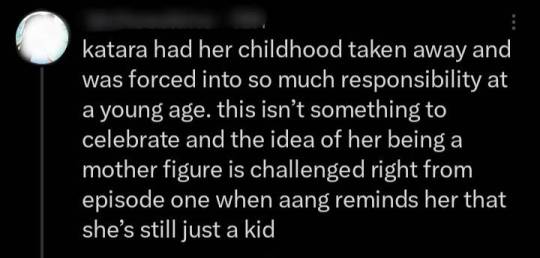
The idea of her being mother figure is challenged right from episode one when Aang reminds her that she's still just a kid.
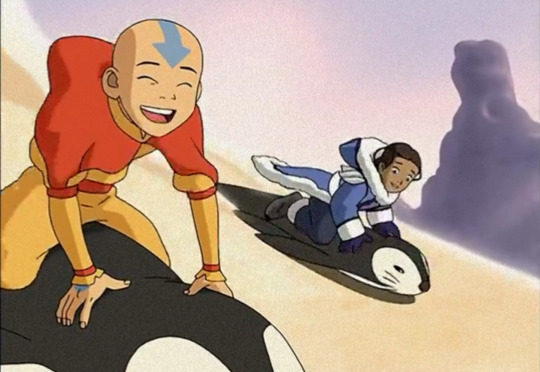
Okay, that's right! That's spot on! I don't deny that Aang makes Katara act like a child again for a while.
Aang reminds her that she's still just a kid.

Katara : Fire Nation. Sokka : We should tell him. Katara : [Yelling.] Aang! There's something you need to see. Aang : [Aang runs to them from the airball court, still playing with the hollow ball. Cheerfully.] Okay! Aang : [Happily runs up.] What is it? Katara : [Innocently holds her hands behind her back.] Uh... Just a new waterbending move I learned. Aang : Nice one! But enough practicing, [Excited as he turns around and start walking away.] we have a whole temple to see! Sokka : [Brushes the last of the snow from his head and shoulders.] You know, you can't protect him forever.
It's only the third episode, but Aang's childish attitude already makes Katara act like a mother protecting her child from reality. Katara also has to calm Aang down when he goes into avatar mode, it happens several times like it's her responsibility to do so.
Aang reminds her that she's still just a kid.
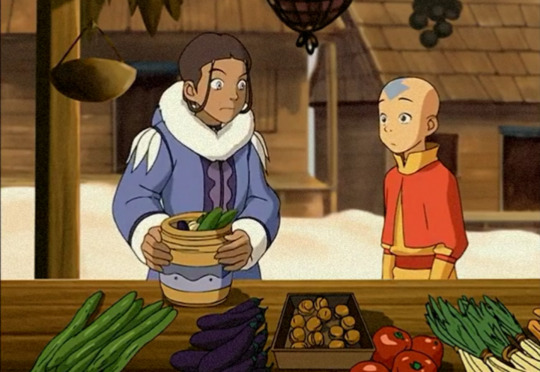
Katara : [Resumed filling the pot with more vegetables.] Watching you show off for a bunch of girls does not sound like fun. Aang : [Disappointed.] Well, neither does carrying your basket. Katara : [Annoyed.] It's not my basket. These supplies are for our trip. I told you, we have to leave Kyoshi soon.
This scene actually piss me off, like, if I were Katara I would mad too! And again, Aang's irresponsible and childish behaviour forced Katara to be responsible for doing the chores. If not her to be mature, who else? Sokka who is busy with his misogyny towards the Kyoshi warriors? Or Aang who is busy having fun with his fans?
Aang reminds her that she's still just a kid.
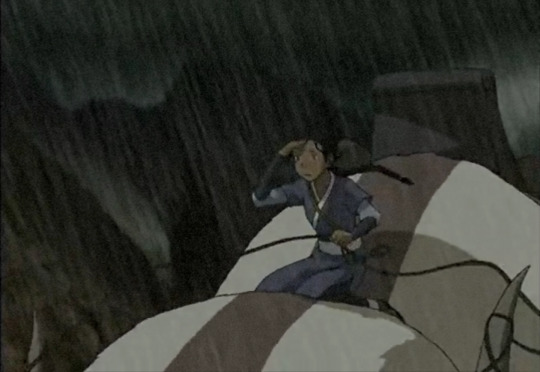
Aang ran away after someone blamed him for something he actually did a hundred years ago. Katara must find him in the storm, then help him dwelling with his past.
And it happens again in The Awakening. Aang runs away and triggers Katara's another trauma that forces her to grow up, which is being abandoned by the person she cares about (her father). Katara (Sokka and Toph) must find him and save him.
Aang reminds her that she's still just a kid.
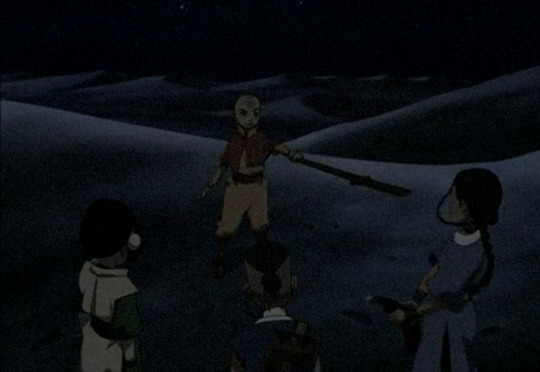
Katara : [Disappointed.] Wow... there's hardly any in here. Aang : [Lashes out.] I'm sorry, okay! It's a desert cloud; I did all I could! What's anyone else doing?! [Pointing his staff at Katara.] What are you doing?! She returns his attack with a shocked look on her face. Katara : Trying to keep everyone together. Let's just get moving. We need to head this direction.
Katara is the only one who can keep the Gaang out of the desert. If she doesn't act mature and responsible with the Gaang, they might not survive. And what does Aang do? Get mad at her for losing Appa, while Katara is not to blame for it.
Aang reminds her that she's still just a kid.
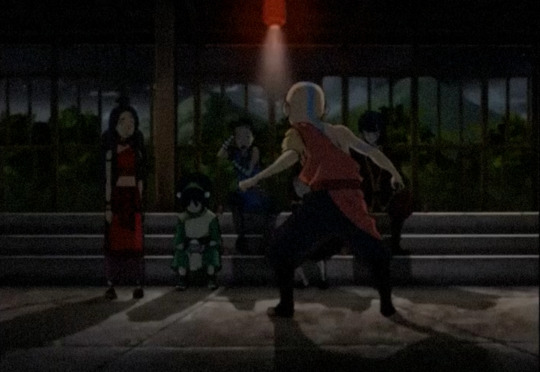
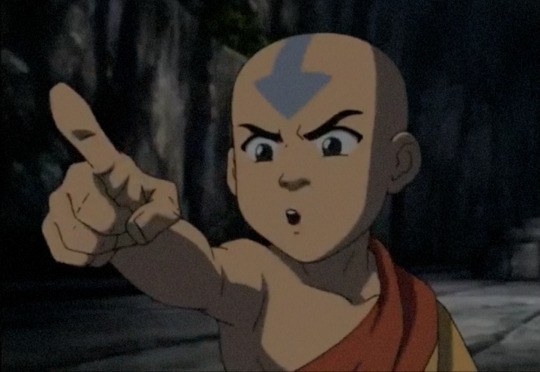
Katara : Aang, we do understand. It's just ... Aang : Just what, Katara? What? Katara : We're trying to help! Aang : Then, when you figure out a way for me to beat the Fire Lord without taking his life, I'd love to hear it! [Walks away.] Katara : Aang, don't walk away from this. [Walks toward Aang.]
I love Katara, you know, that's why I really don't like Aang pointing angrily at Katara and blaming her every time he got emotional, when Katara didn't do something wrong and just wants to help him. Is this a healthy relationship?
Aang reminds Katara that she's just a child in the first episode, but unfortunately, the Gaang (especially Aang) once again forces Katara to be motherly in the next episodes.
Does she like being motherly? No, she doesn't. She wants to have fun too, but if she did, the Gaang would be screwed. Being motherly is not just her nature, but the Gaang (except Suki) forces her to be more mature than the others narratively.
Actually, that's why I like the idea of Momtara and Dadko. In my opinion, this nickname is not to make her forget she is just a kid. Instead, because the narrative itself always shows Katara forced to act motherly toward Gaang, 'Momtara and Dadko' shows that is not only Katara's responsibility to do all chores.
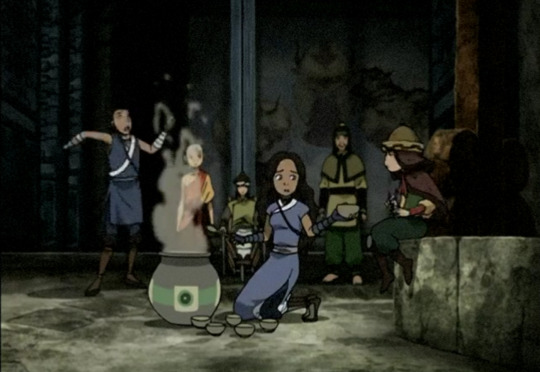
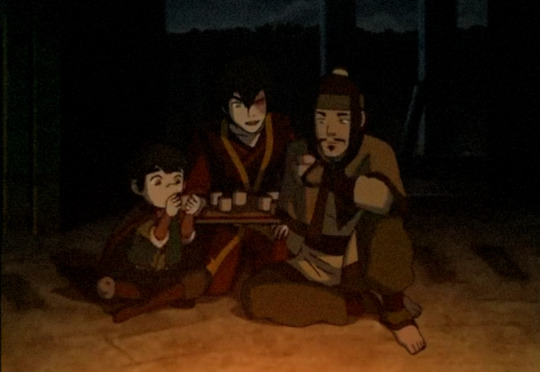
Calling Zuko Dadko is also reasonable, because he is narratively more mature among the Gaang (except Suki). He focuses on Aang's training and worries that Aang will fail, just like what father usually do to his son.

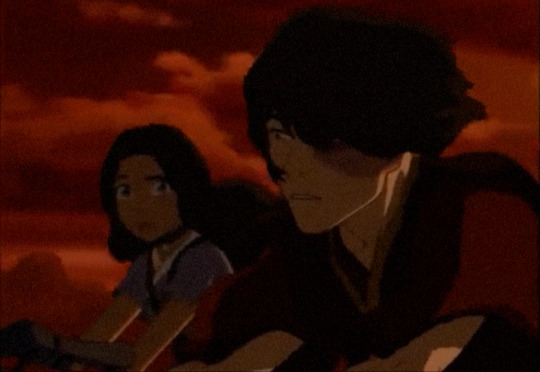
More than that, Katara doesn't need to act motherly with Zuko - he is the one bringing her things and preparing what they need in their journey contras with what Aang did in Kyoshi Island. And they act more like equal partners toward each other, rather than mother and son.
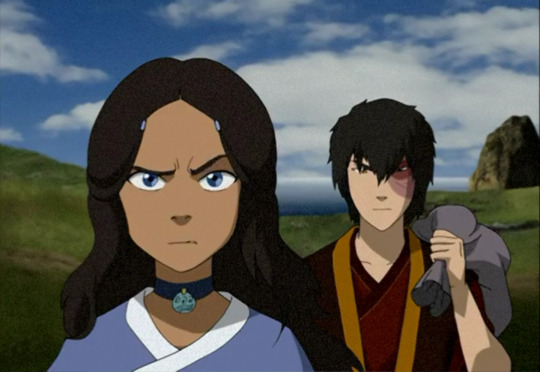
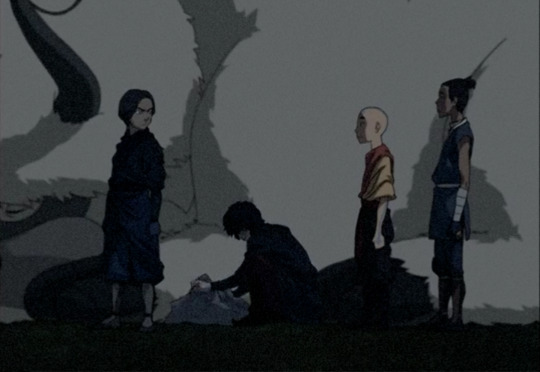
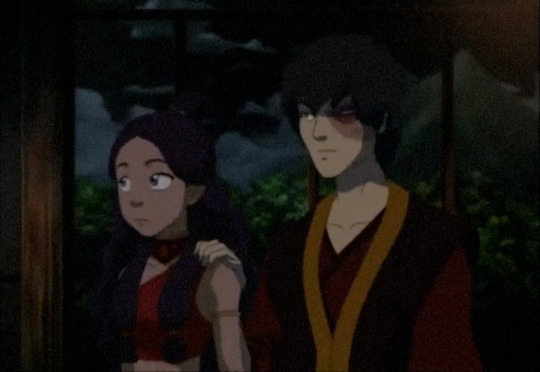
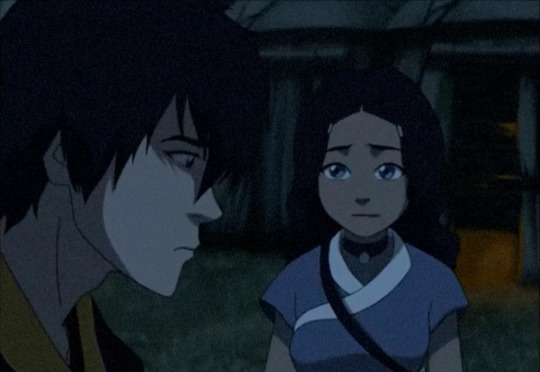
Oh, it's true that Aang makes Katara child again in first episode. But it's weird to defend Kat/ang and hate the narrative of Katara being motherly at the same time, when the Gaang (especially Aang) often forced Katara to act motherly.
#zutara#pro zutara#anti anti zutara#anti kataang#anti bryke#aang critical#atla critical#momtara and dadko
652 notes
·
View notes
Text

????? creepy…? Aang didn’t view Katara as a mother or mother figure within his life, lol. Like, ever. Show me when and where Aang ever thought of her in this way?
Y’all are invalidating the love Aang had for his father Gyatso who actually raised him from the time he was a baby. Aang viewed Gyatso as his parent. He loved Gyatso as his parent. He proudly states to Katara and Sokka that Gyatso “taught me everything I know.” Stop erasing Aang’s bond with his actual parental figure in canon. Aang’s love for Gyatso and grief over losing him is what everything else in the story revolves around. The disrespect you idiots show to this relationship is ridiculous. We need to start gatekeeping this show I’m so serious
The first thing Aang did when he met Katara was to ask her to go play with him as the children they are. He then reminded her that she was still a child, too. Aang always viewed Katara as his peer and equal, his best friend—NEVER his parent.
If Aang viewed Katara as his parent, that means he would view her as having authority over him. Which he doesn’t. That also means he would expect her to care for him, which he very much doesn’t.
In fact, the exact opposite is depicted. Aang actually canonically struggles with and rejects Katara’s affections toward him, multiple times. It is portrayed as difficult for him to allow her to show him love, something he has to get over as the show continues. Aang never asks Katara for anything, and he doesn’t expect her to do things for him. She does all of these things of her own free will. Katara also hates that Toph views her as motherly. The only time Katara even speaks on this is when she is arguing with Sokka and Toph. Guess who isn’t a part of this in regards to viewing Katara as motherly? Aang. He doesn’t speak on any of this and the episode doesn’t focus on his and Katara’s relationship because they don’t treat one another the way Katara treats Toph and Sokka. The only time Katara ever acts “motherly” toward Aang is in that very episode, and it’s played for laughs… because she isn’t his mom lol
Also, the EIP episode wasn’t “insane” 😂 and it definitely wasn’t proof that Katara didn’t love Aang. If anything, she’s verbally affirming she does love him romantically. She just set a boundary, because she was afraid he might die and she would be unable to revive him like she had in the book 2 finale. It’s really not that difficult to understand…
Also.. if Aang getting broken out of the ice is a metaphor for …. Childbirth…. Then did Katara birth Appa too ? 😭😂 help it’s sending me
#monk gyatso#Katara#Aang#kataang#pro kataang#avatar the last airbender#atla#anti zutara#anti zutara shippers#anti zutara stans#anti zutara fandom
304 notes
·
View notes
Text
It's Zutara Month 2024 So I'm Gonna Discuss (See: Fangirl) Them and Emotional Labor
Katara cooks, sews, but most of all: she gives unconditional emotional support for her brother, and later the rest of the Gaang.
Illustrated after Appa was stolen, the Gaang got stuck in a desert without much water, food or any means of transportation besides their legs. Katara gave everyone her bending water, without drinking any herself, responded to everyone with compassion, and by the end she helped bring Aang back to himself while he was out of control in the Avatar State.
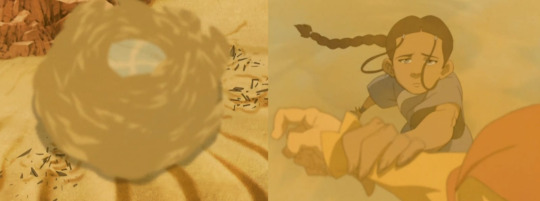
Even after the episode is over, next episode and she helps delivering a baby, and still makes sure to look after Aang.
Sokka too testified that Katara did a lot of labor for him:
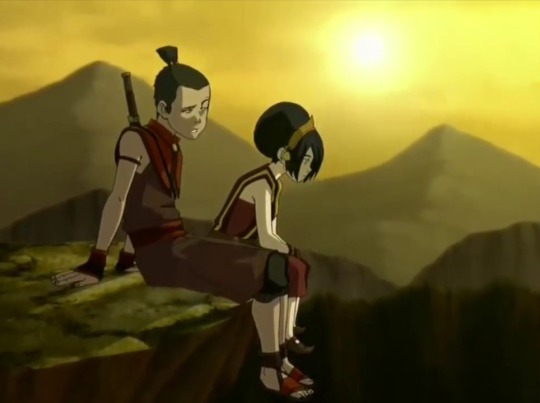
Sokka: Actually, in a way, I rely on [Katara's bossiness].
Toph: I don't understand.
Sokka: When our mom died, that was the hardest time in my life. Our family was a mess, but Katara, she had so much strength. She stepped up and took on so much responsibility. She helpwd fill the void that was left by our mom.
Toph: I guess I never thought about that.
And appropriately, Katara is the one doing the vast majority of the emotional labor in her relationships. She takes care everyone, comfrots them, and protects them. Take "The Deserter" as an example: Aang was being extremely careless with his new found fire bending ability, to the point where he accidently burns Katara's hands.
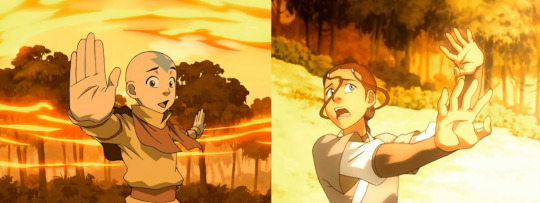
Katara herself never express her anger at him, she ends up healing her own wounds. Sokka does the scolding. A\ang felt incredibly guilty, but still – by the end, Katara is the one comfroting Aang when he wants to give up on fire bending.
Katara takes care of everyone in the Gaang, making sure they're well, helping them heal their scars. Moreover, Katara often brings up her own grief to empthize with other people's loss. It's a pattern of sorts:
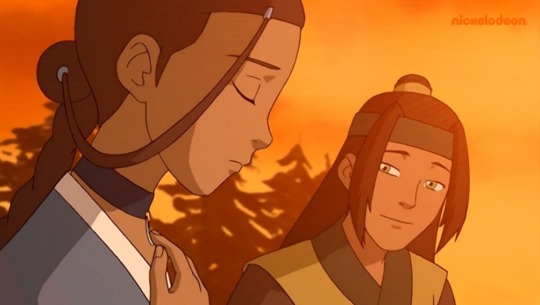
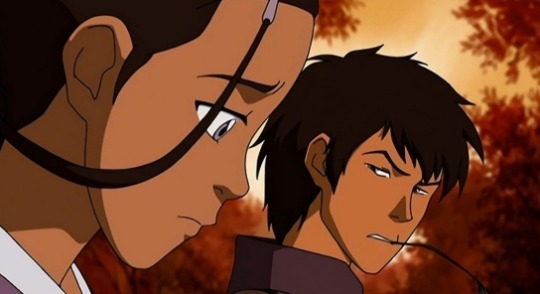
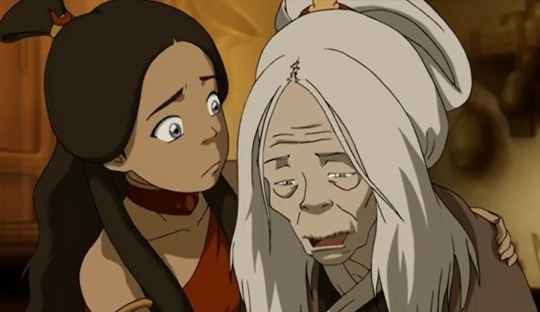
1) A character talks about their past with the Fire Nation
Haru: Yeah. Problem is ... [Close-up, earthbends two stones in a circle above his hand.] the only way I can feel close to my father now is when I practice my bending. He taught me everything I know.
Jet: The Fire Nation killed my parents. I was only eight years old. That day changed me forever.
Hama: I'm sorry. It's too painful to talk about anymore.
2) Katara brings up her own grief, sympathizing with their loss
Katara (to Haru): See this necklace? My mother gave it to me.
Katara (to Jet): Sokka and I lost our mother to the Fire Nation.
Katara (to Hama): We completely understand. We lost our mother in a raid.
A\ang is a bit of an exception, given that she brought up her grief to prepare him for the loss of his people. (Ad they all respond sympathetically). Still, she brings it up to sympathize and help. There is nothing wrong with that, of course. but here is how it went with Zuko:
1) A character talks about their past with the Fire Nation
Katara: You have no idea what this war has put me through! Me personally! The Fire Nation took my mother away from me.
2) Katara brings up her own grief, sympathizing with their loss
Zuko: I'm sorry. That's something we have in common.
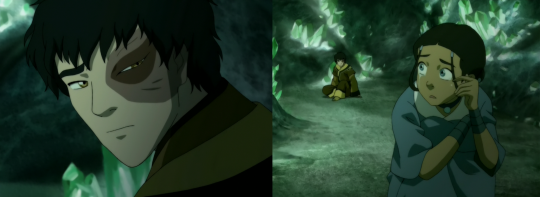
It's Zuko who responds to her grief this time. It's him empathizing with her. It's him doing the emotional labor for her. And it's this sympathy is their first real civil conversation, establishing that in their relationship, Zuko will do some of the labor needed of him.
In The Southern Raiders, Katara opens up to Zuko, compleyely unprompted, while she is yet to forgive him, about the precise events that led to her mother's death.
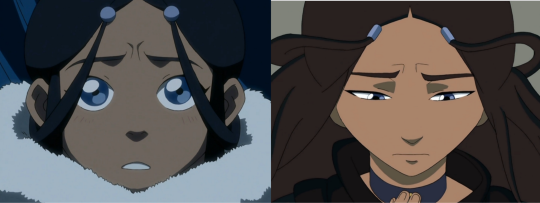
A thing she has never done with anyone, and is doing now with someone she considers untrust worthy. Zuko responds with "your mother was a brave women". She, once again, is on the reciving end of the emotional labor – and in a way that is deeper than any other intance of her in the show.
In rest of the episode, Zuko is the one thinking of her and taking care of her.
Exhibit A:
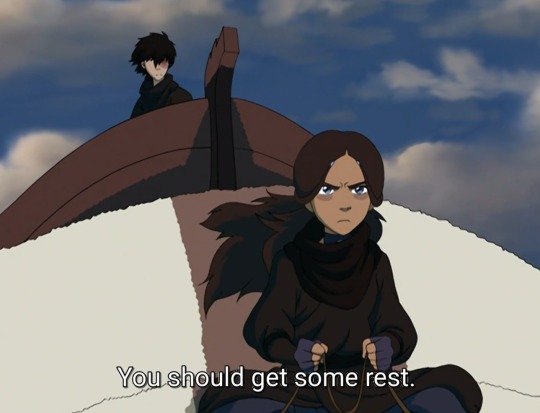
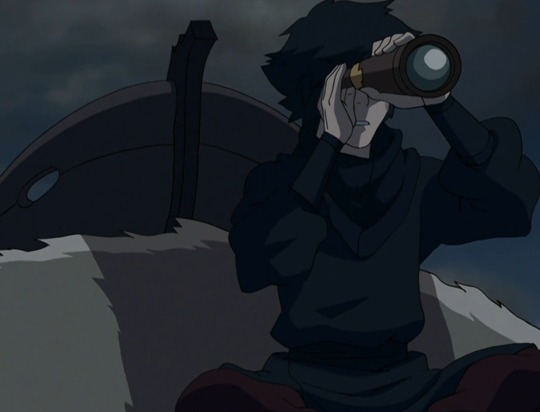
Exhibit B:
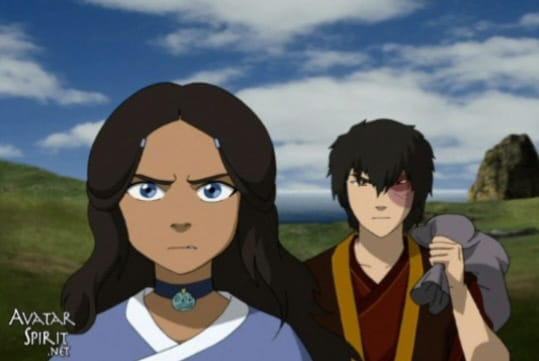
Exhibit C:
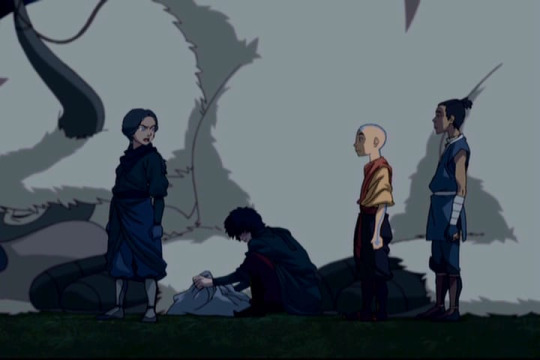
Katara takes care of everyone, but it is with Zuko that she recives the help she deserves.
She put herself in danger to help A\ang, she helpped him after he'd burnt her, and she stepped up when her mother died. But with Zuko, he is the one reaching out. He's the one taking care of her needs.
#zutara#zutara month 2024#zutara month#zutara meta#pro zutara#anti anti zutara#zuko x katara#katara x zuko#zutara analysis#zutara evidence#zutara forever#zutara nation#zutara should have been canon#zutara supremacy#zutara was robbed#zutarian
210 notes
·
View notes
Text
Debunking The Stupidest Pro-Zutara Claims.

Howdy y’all.
If you follow me, you know I’m a Kataang truther and a Zutara hater. I always thought Kataang was cute as a kid, but I honestly didn’t appreciate how mutual and well developed their relationship more until I was older. By contrast, I didn’t think much of Zutara initially, I knew it had a huge following and I kinda got why, they have a very interesting dynamic that drastically changes and them becoming friends is heartwarming, but I never got the hype. Then I saw this…

And I was utterly baffled at the mischaracterization, media-illiteracy, Zuko dickriding and Aang demonization on this post. Let’s have a look…
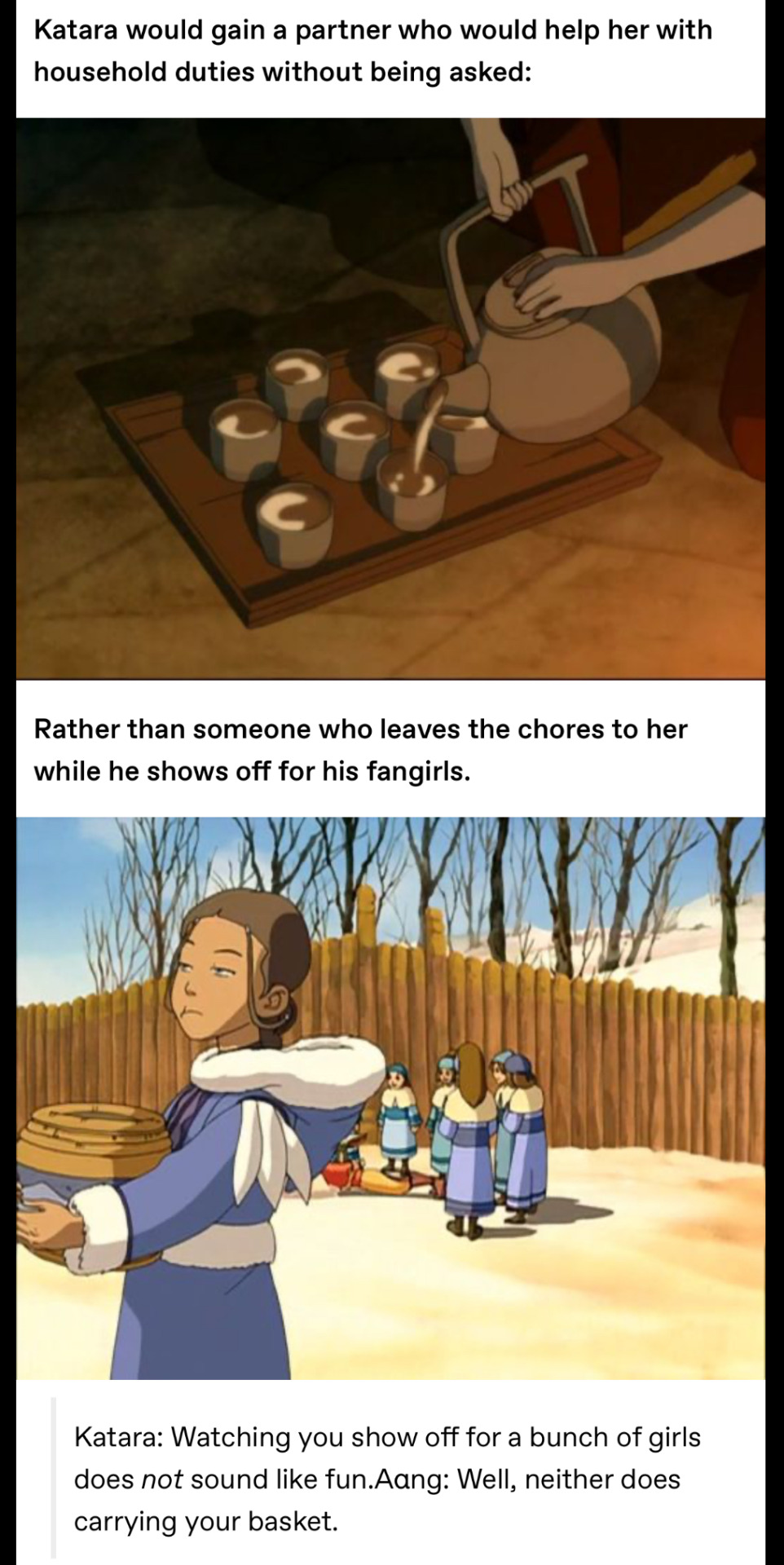
See what I mean about the Zuko dickriding and Aang demonizing. You compare one scene of Zuko making tea for everyone in Book 3, to Aang showing off in Book 1. Need I mention that Aang later apologized for getting big-headed by the end, and later episodes show that Aang (and the rest of the group) all work together. Right off the bat and we get this dumb Katara/Cinderella narrative.
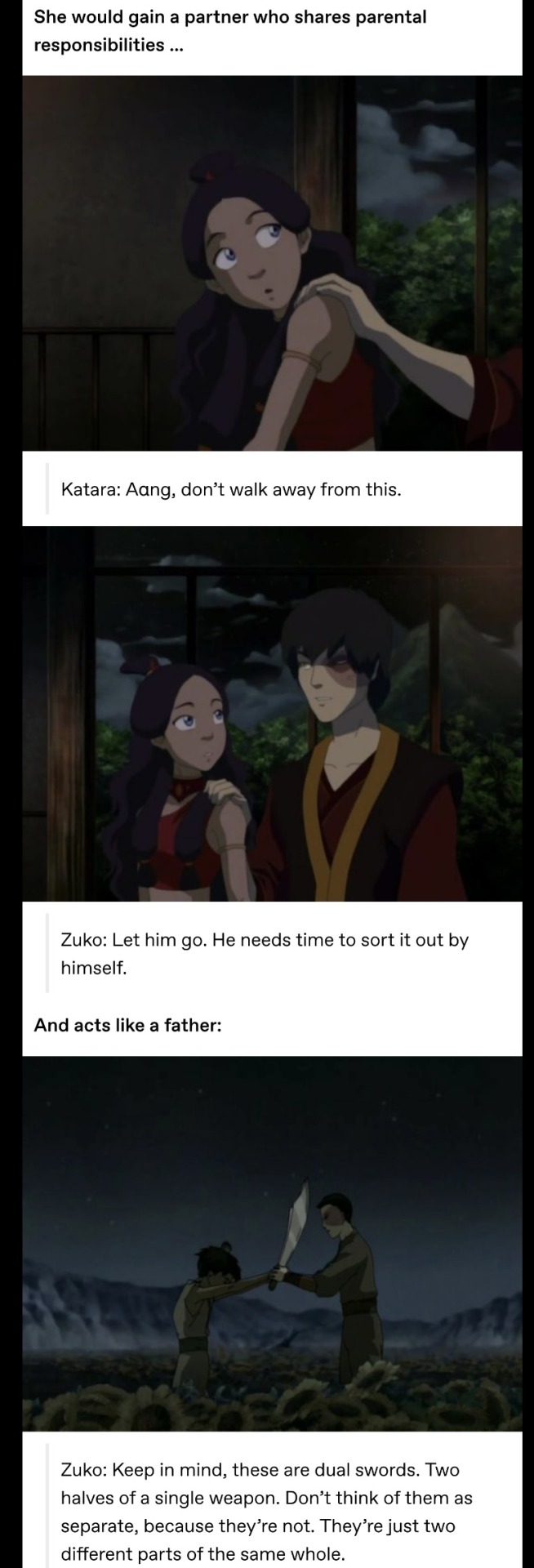
Not another Dadko. Momtara I kind of get, but Zuko is not a father figure. Zuko himself is still young, still growing, still capable of being immature. The first moment isn’t even a parental thing, it’s more Zuko stopping Katara from confronting Aang because he somewhat understands Aang’s frustration of being unsure and conflicting about a huge decision, because he’s been there not long ago.
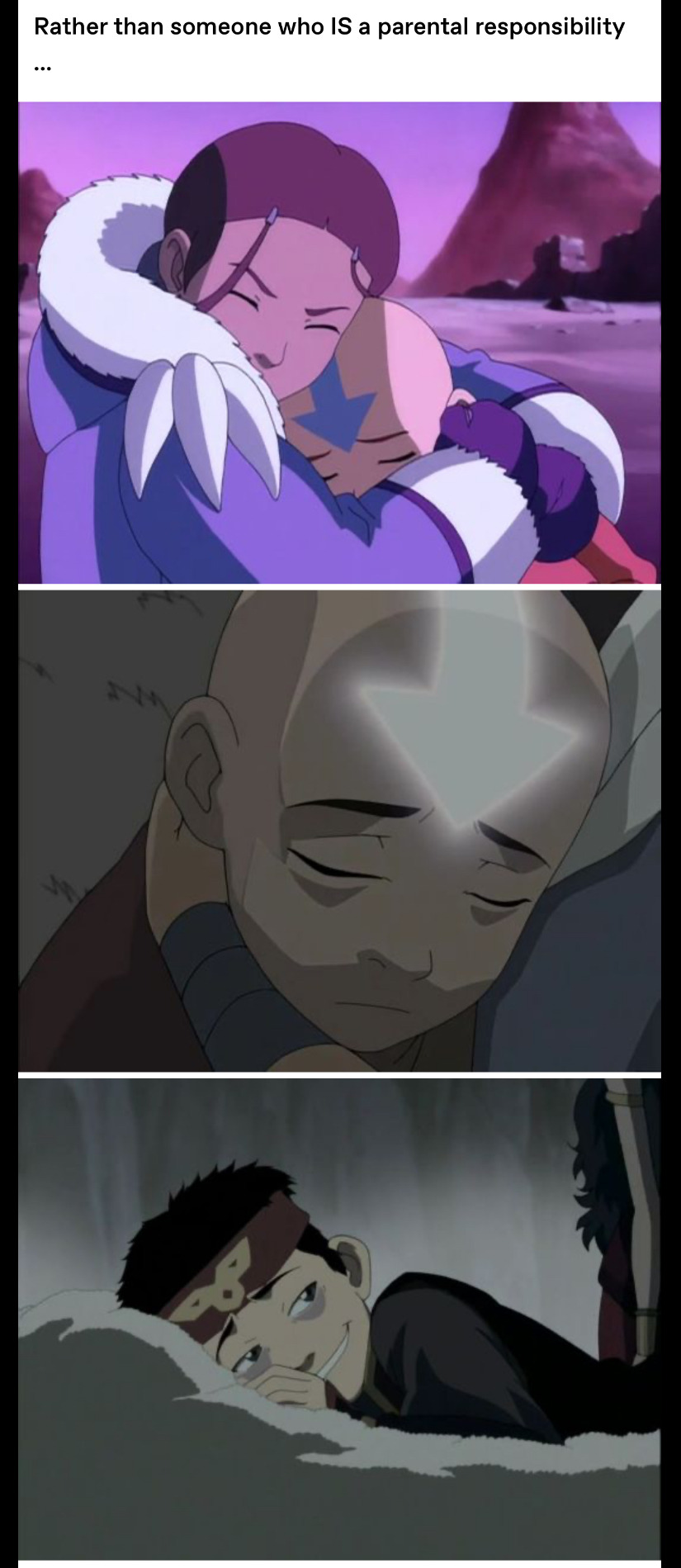
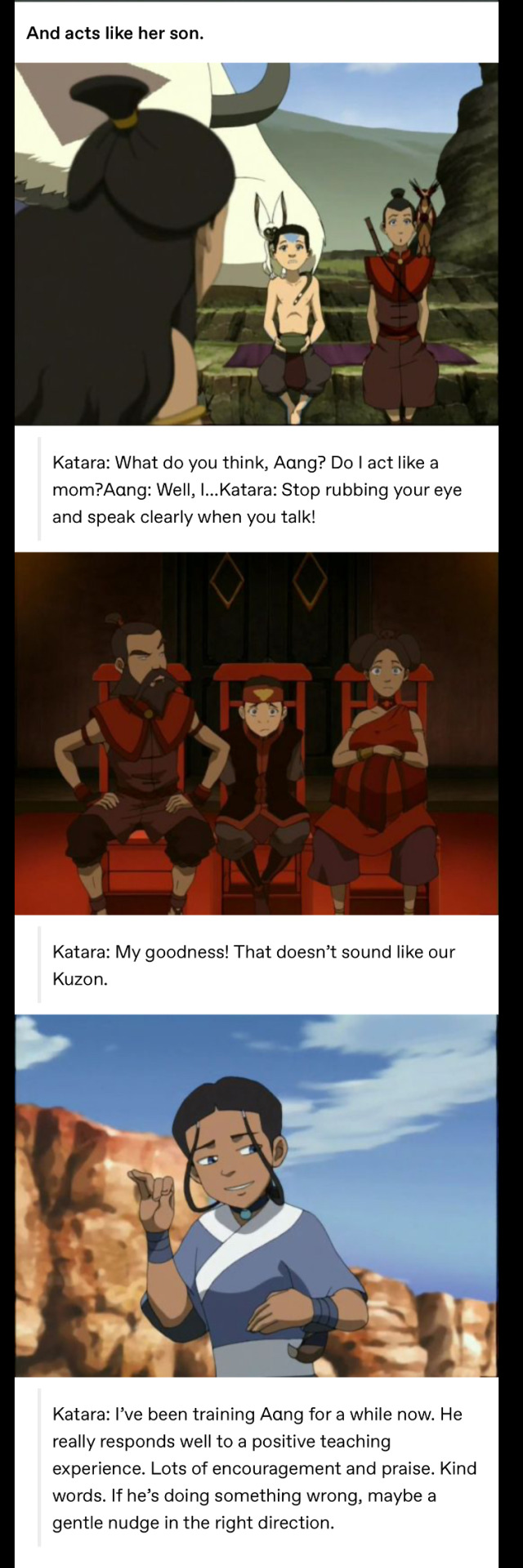
Comforting someone when they’re worried or grieving isn’t parental responsibility, that’s being empathetic and good friend. Katara comforts Zuko when he’s worried about comforting Iroh and these people lap that scene up.
“Aang acts like Katara’s son” is such a baseless argument. Ignoring the fact that Aang canonically has romantic feelings for Katara and vise-verse, the first moment was a one-off joke about Katara being motherly, the second was also a joke where Katara PRETENDS to be Aang’s mom and her brother’s husband, the last moment is Katara telling Toph how she TRAINS Aang because she’s his Sifu and so it Toph, does that mean Toph is also Aang’s mom?
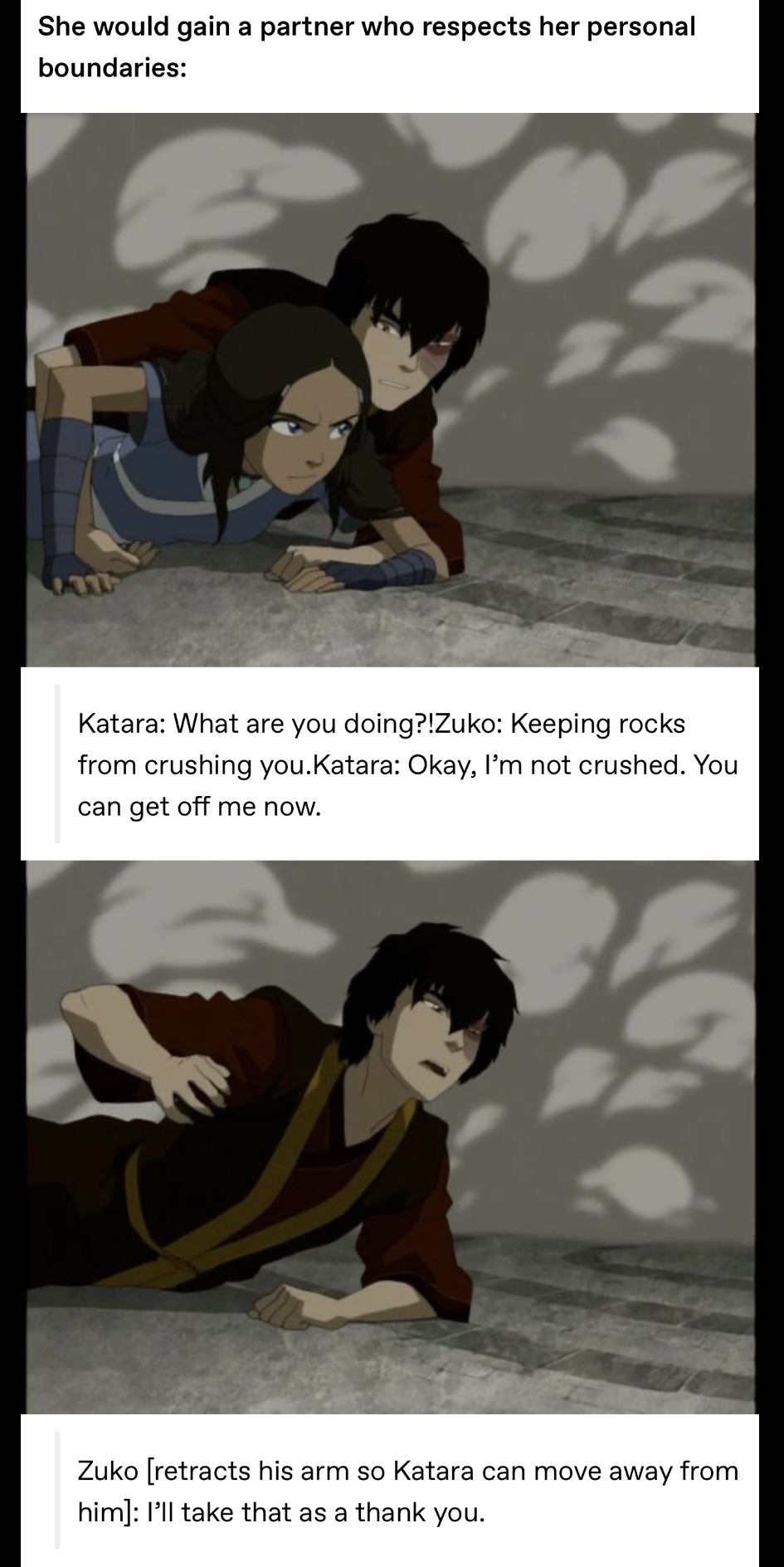
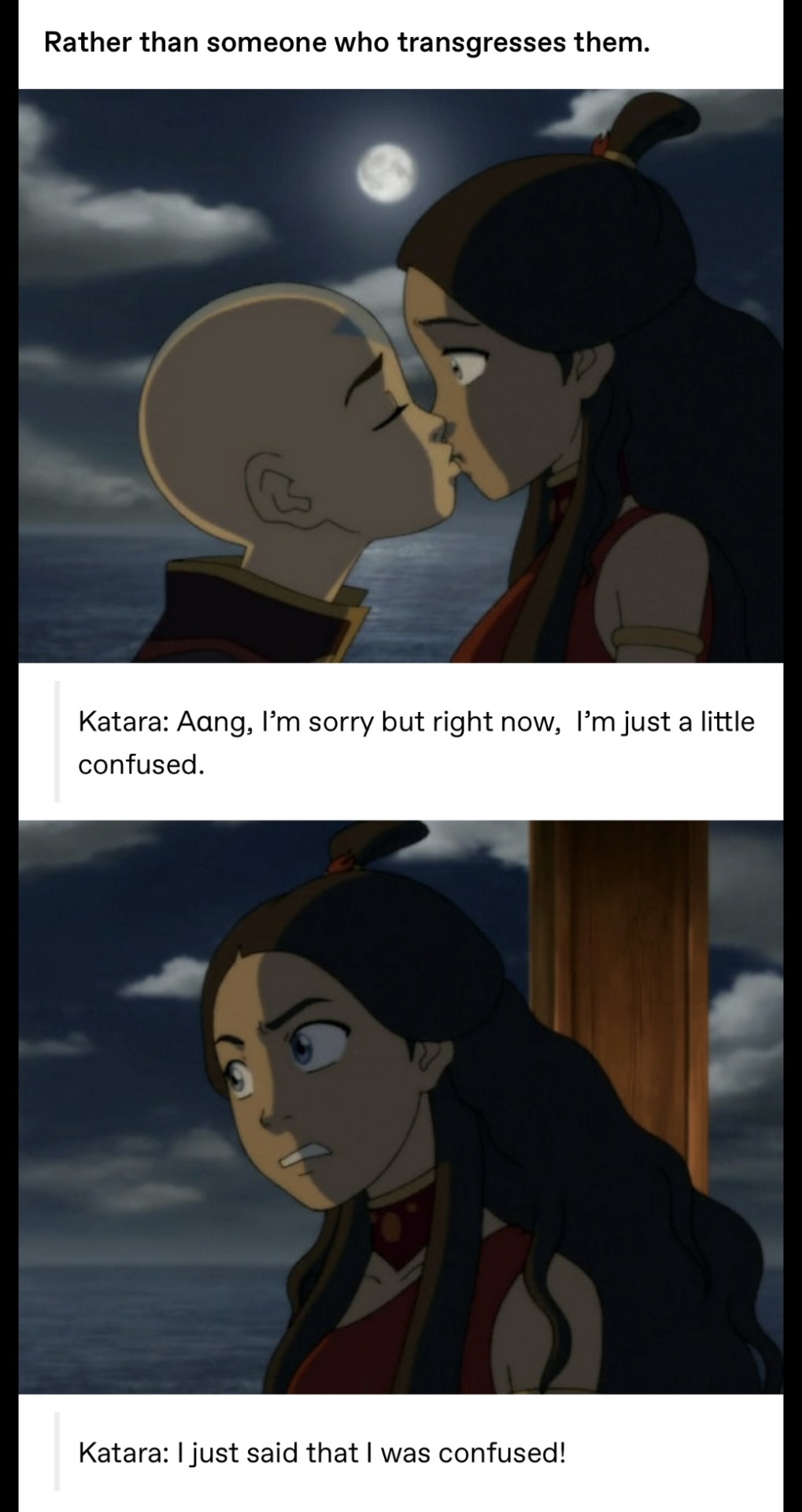
Let’s go over this for the umpteenth time: Aang kissing Katara was wrong, it was bad, we should’ve seen him apologize, but he immediately regretted what he did, he knew he messed up, he’s not a sexual-assaulter, blah, blah blah. The problem with this is that these are both completely different situations and also Zuko had to be told to get off Katara, so not only is this point meaningless, but it doesn’t even support Zutara.
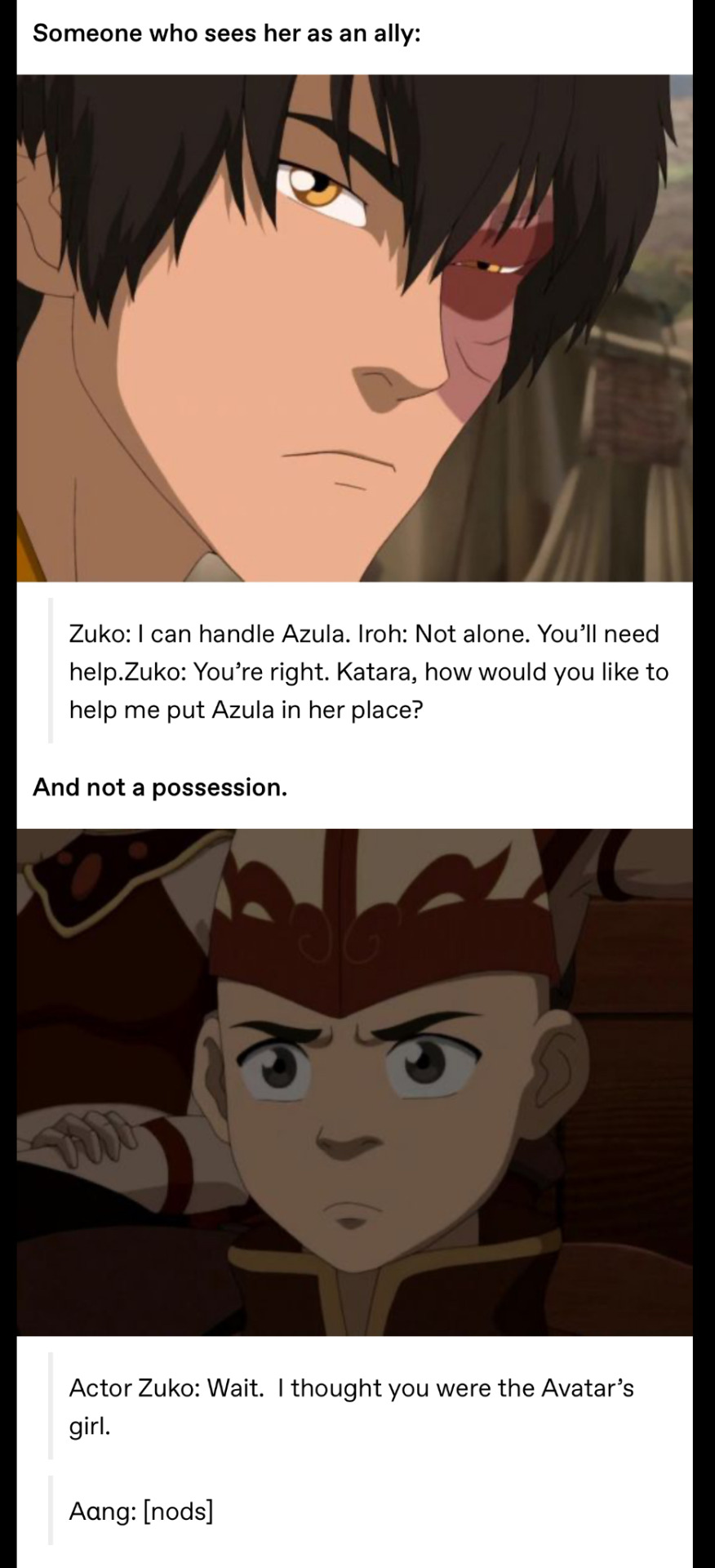
This has gotta be one of the dumbest arguments here, Aang has always seen Katara as an ally and dear friend first and foremost since day one. Admittedly Aang was somewhat possessive here, but him nodding mean he literally though Katara was his possession, more so him thinking Katara returned his feelings (which she did). But throughout the entirety of the show Aang sees Katara as not only an ally, but a friend, a fellow waterbender, Zuko only saw her as a friend and ally near the very end of the show, before that he simply saw her as a peasant in the way of his goal.
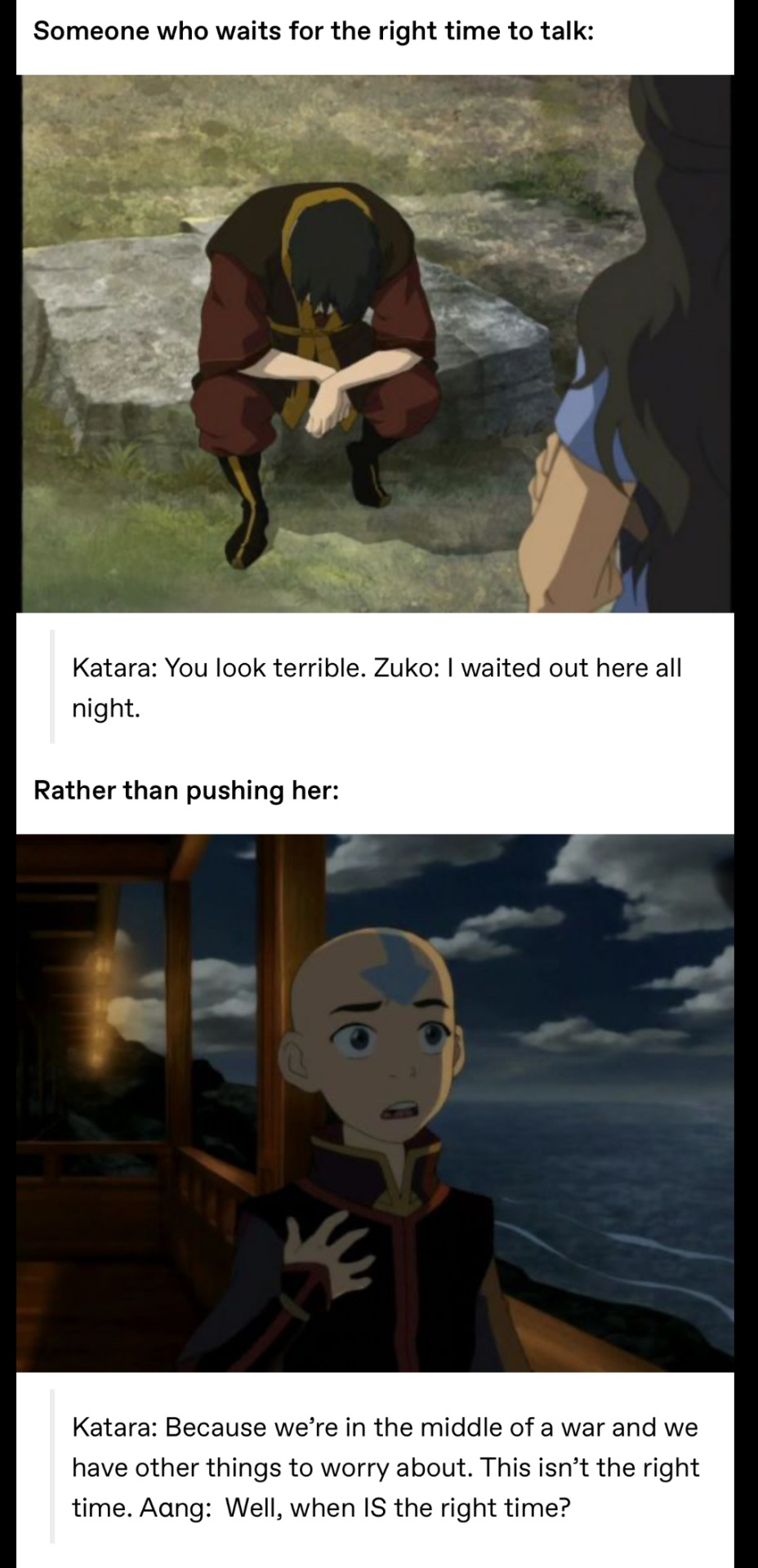
Again, both of these are completely different contexts and both Aang and Zuko were pretty adamant about how Katara feels about them. Zuko frustratingly confronts Katara about why she’s mad it him, he wants to earn to trust and sleep deprives himself so he can resolve this as soon as she wakes up. Katara asks why Aang is so crestfallen, he explains part of the reason, Aang (while being somewhat pushy) wants to know how Katara feels before he confronts Ozai in life or death.
Both are different situations and really I wouldn’t say either is better than the other.
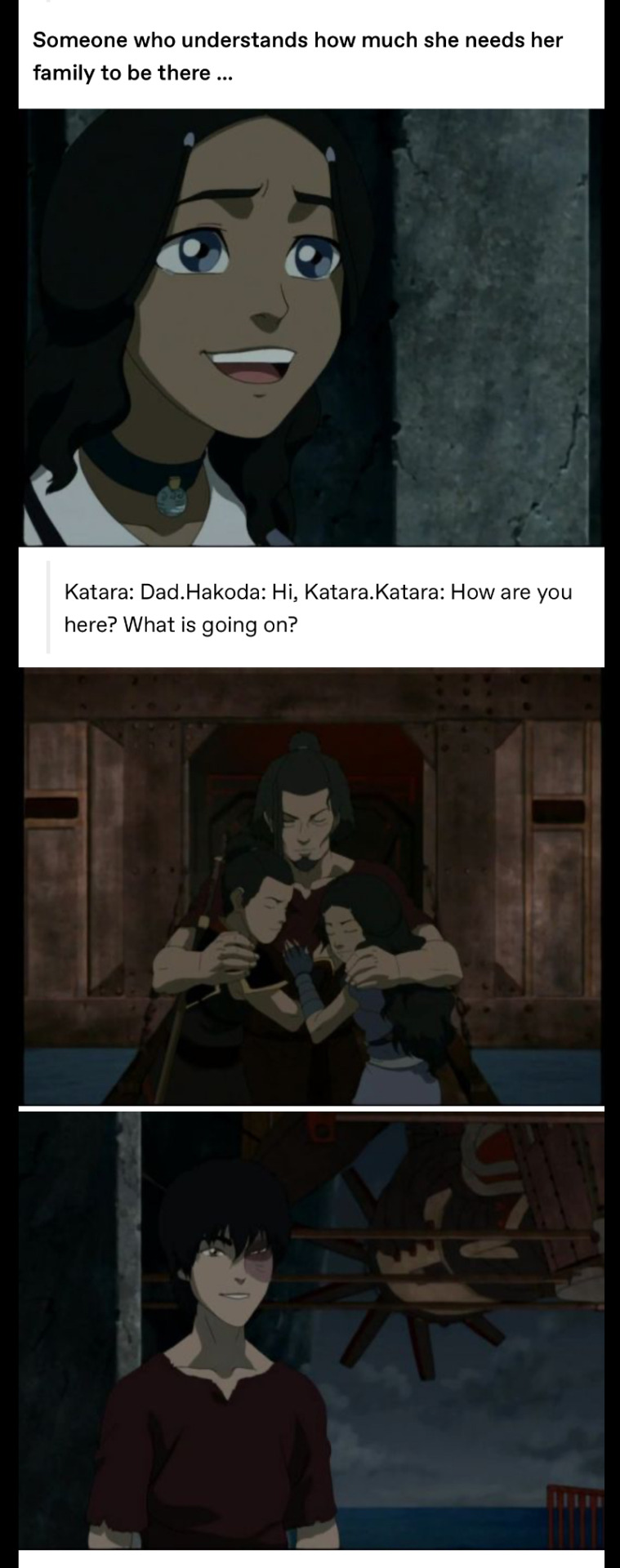
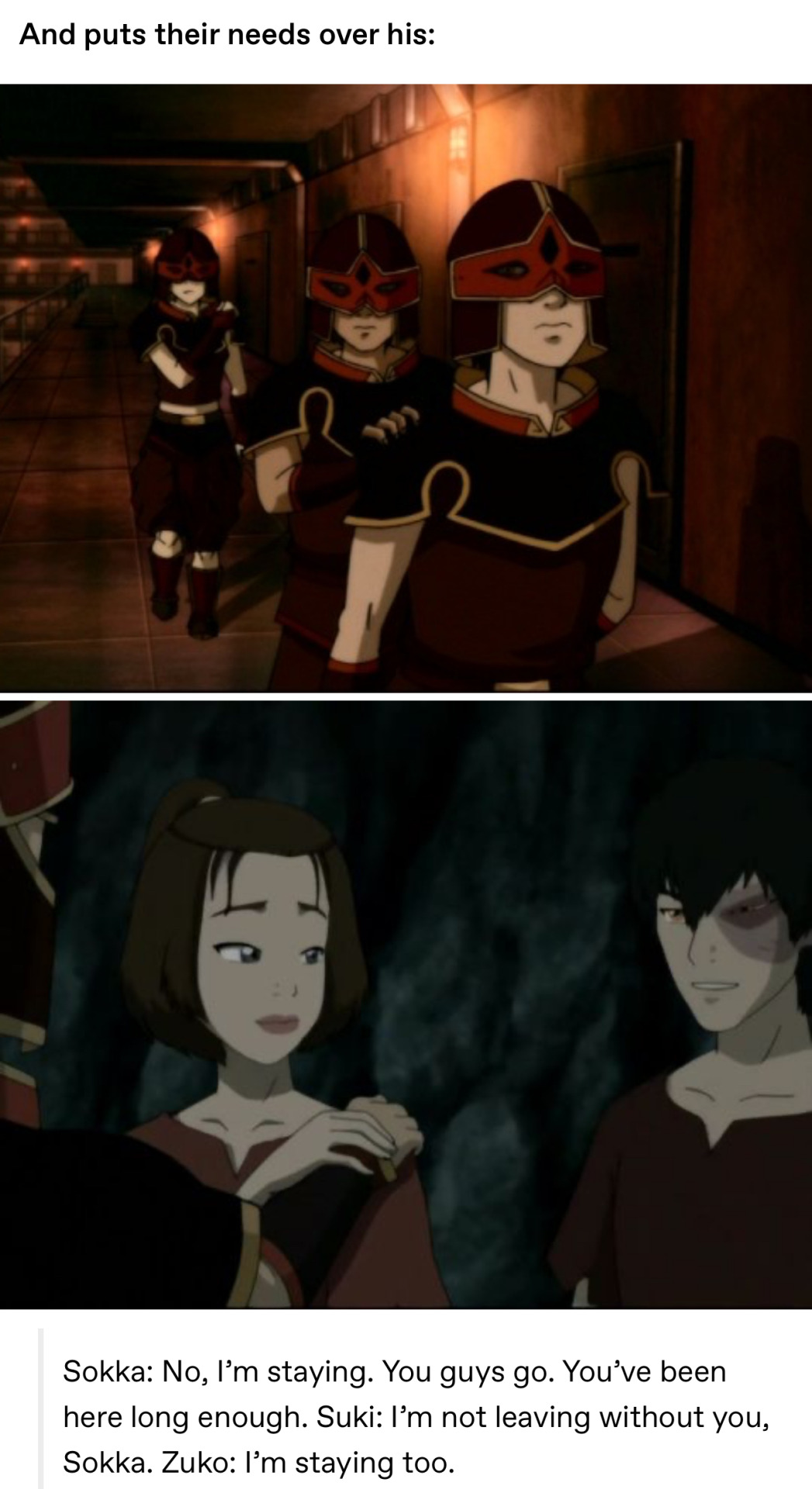
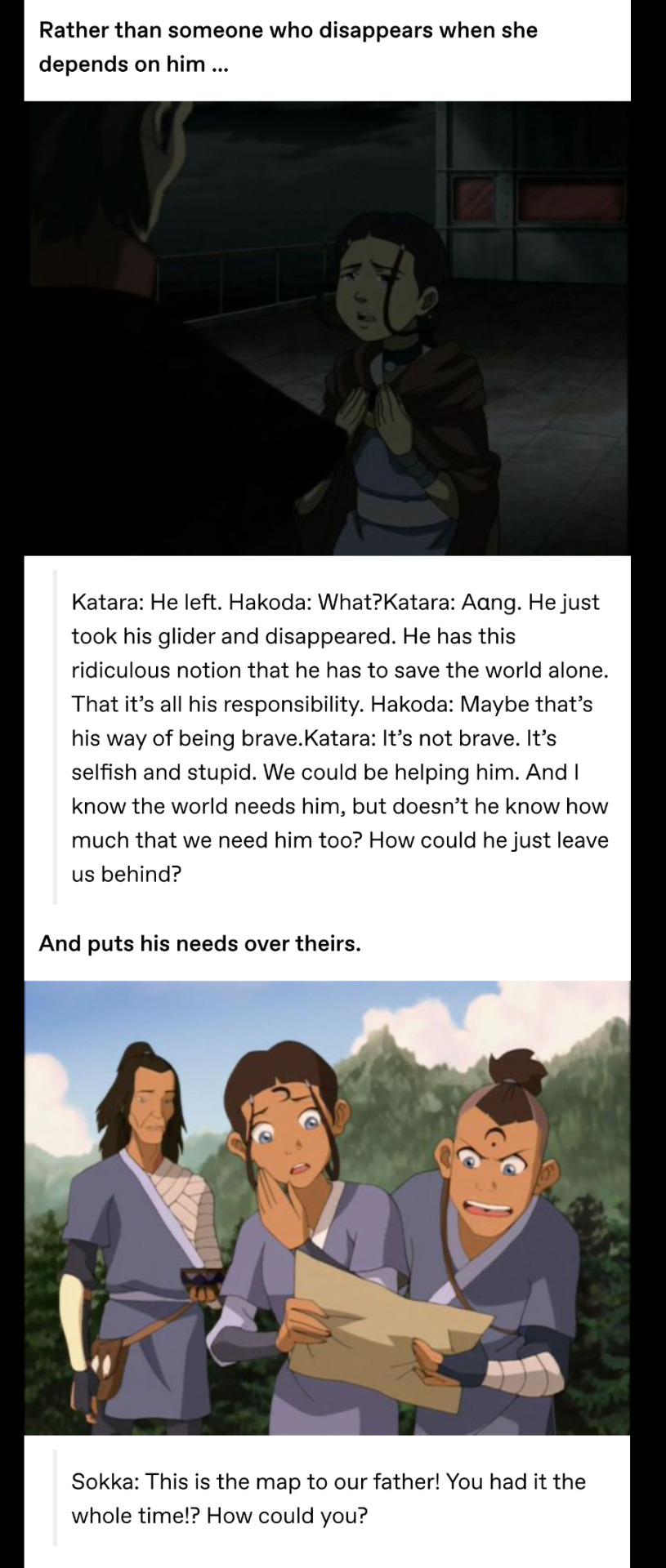
Okay, there’s a lot wrong with these points, lemme go over them as best as I can.
Aang has put his needs over Katara’s several times, just to name three: he gave himself so the Fire Nation would spare her home, was willing to forgo his own Waterbending because Pakku wouldn’t train her, willingly put aside mastering the Avatar State because SHE WAS IN DANGER!
Aang understands the importance of Katara’s family, he leaves so as to to come between Katara and her family when she threatens to leave, he brings back her necklace knowing how much it means to her.
In both of mentioned Aang instances, he realized he was wrong and he and Katara reconciled, the first instance was out of a misguided attempt to set things right after he was killed, and the former is something Aang would never do again, in a later episode he actively takes Sokka to his father and Aang is content for he and Katara to go their separate ways for a while. I find it utterly hypocritical to be a Zuko dickrider while bashing Aang for mistakes he regrets, apologizes for and learns from, you know who else does that?
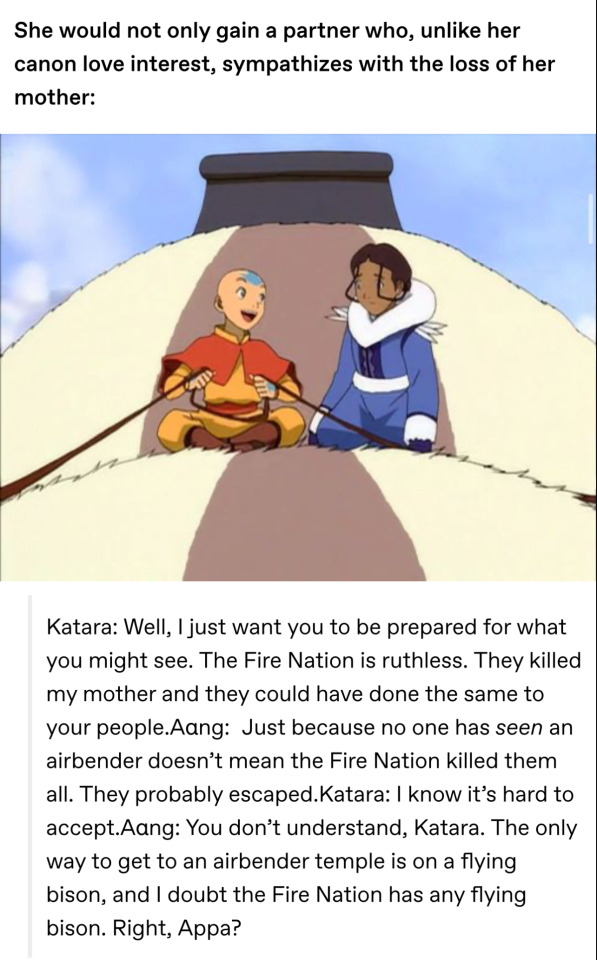
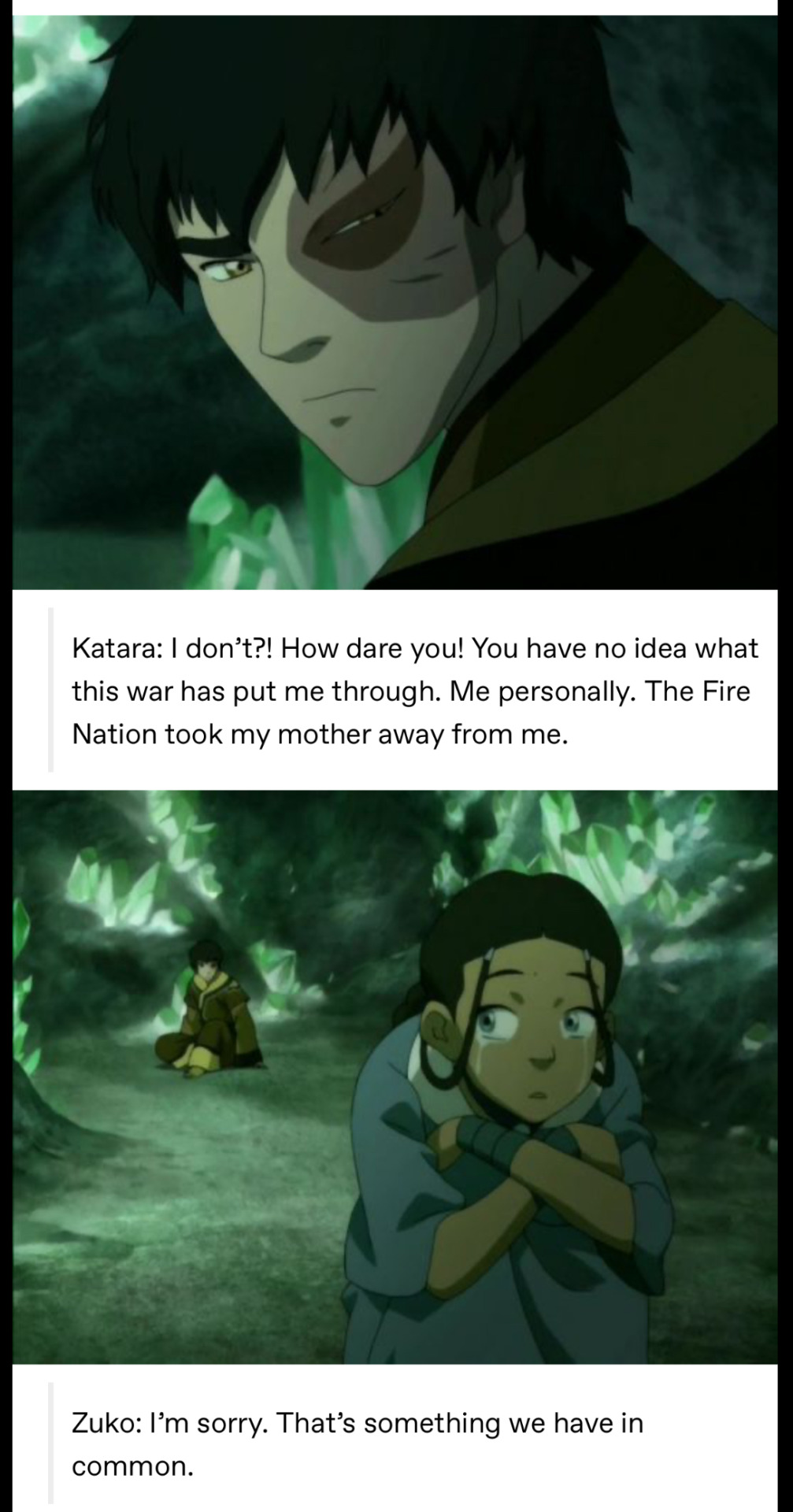
Once again, THE CONTEXT! In the first scene Katara mentions her mother’s death in a more matter of fact way to explain to Aang that the Fire Nation have killed a lot of people including his own. Aang however in a state of denial dismissed the idea of his own people being killed. In the second scene Katara lashes out at Zuko for all the trouble he caused and Zuko after going through some development prior empathizes with her in a way to get Katara to understand he means no harm.
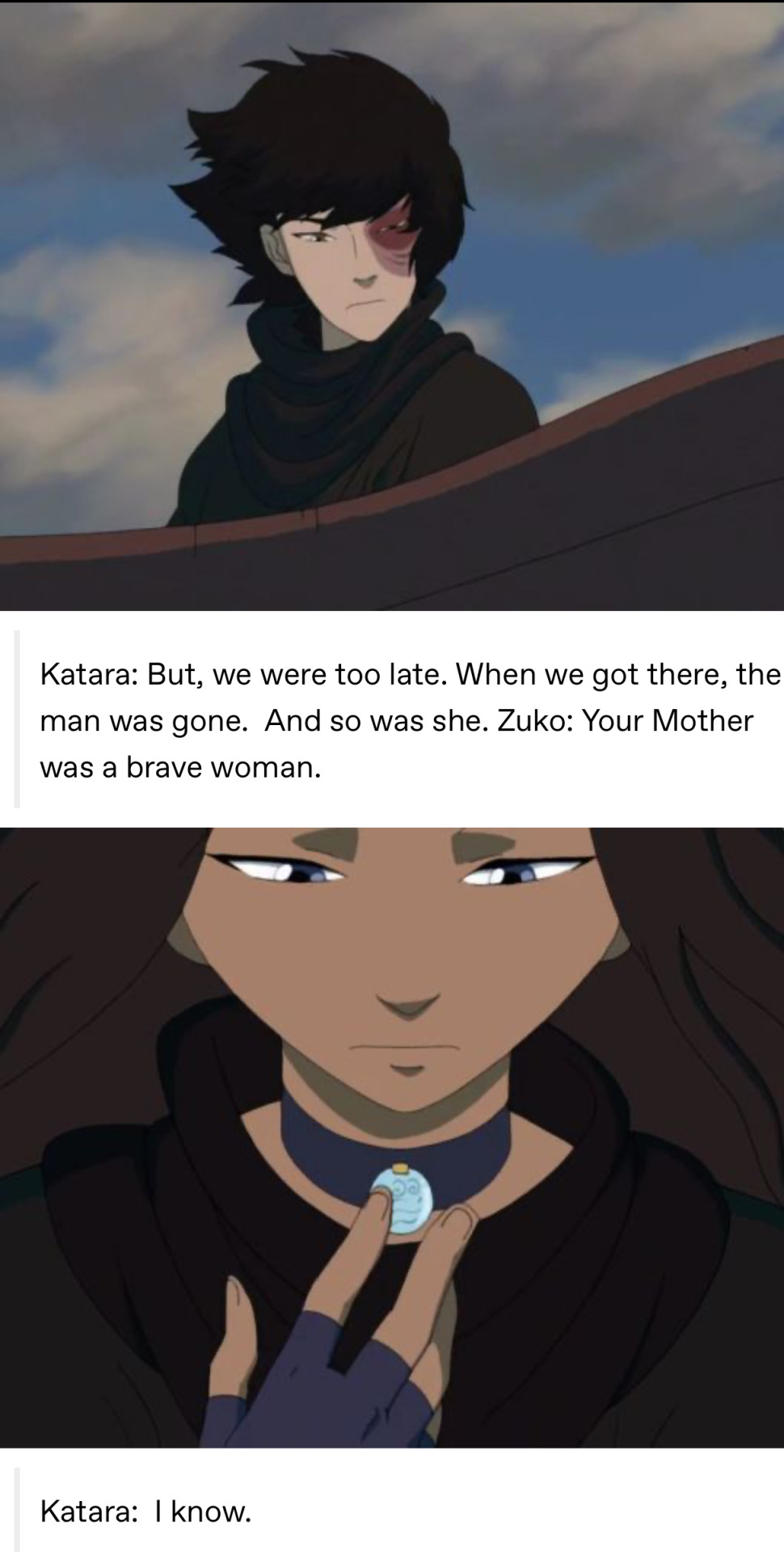
Aang also empathized with Katara’s loss. In this same episode, he himself says he knows what it’s like to feel the pain and rage Katara feels, specifically when he found out all his people were dead and encouraged Katara to confront the person who caused said pain.

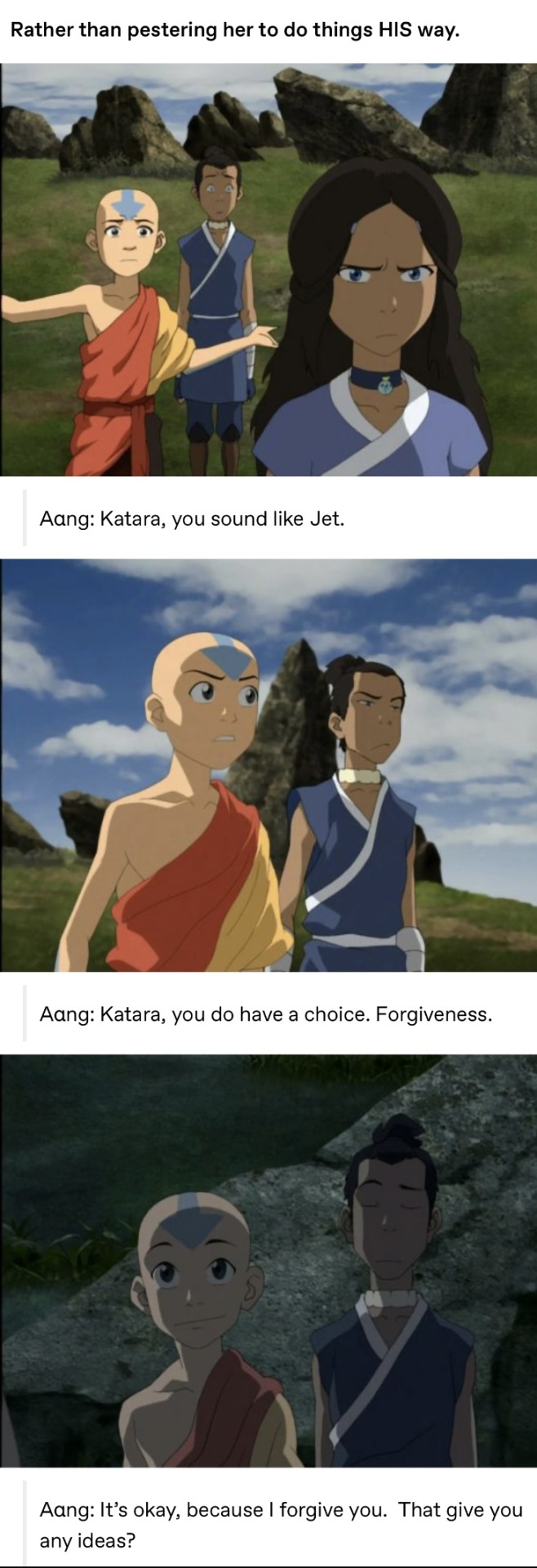
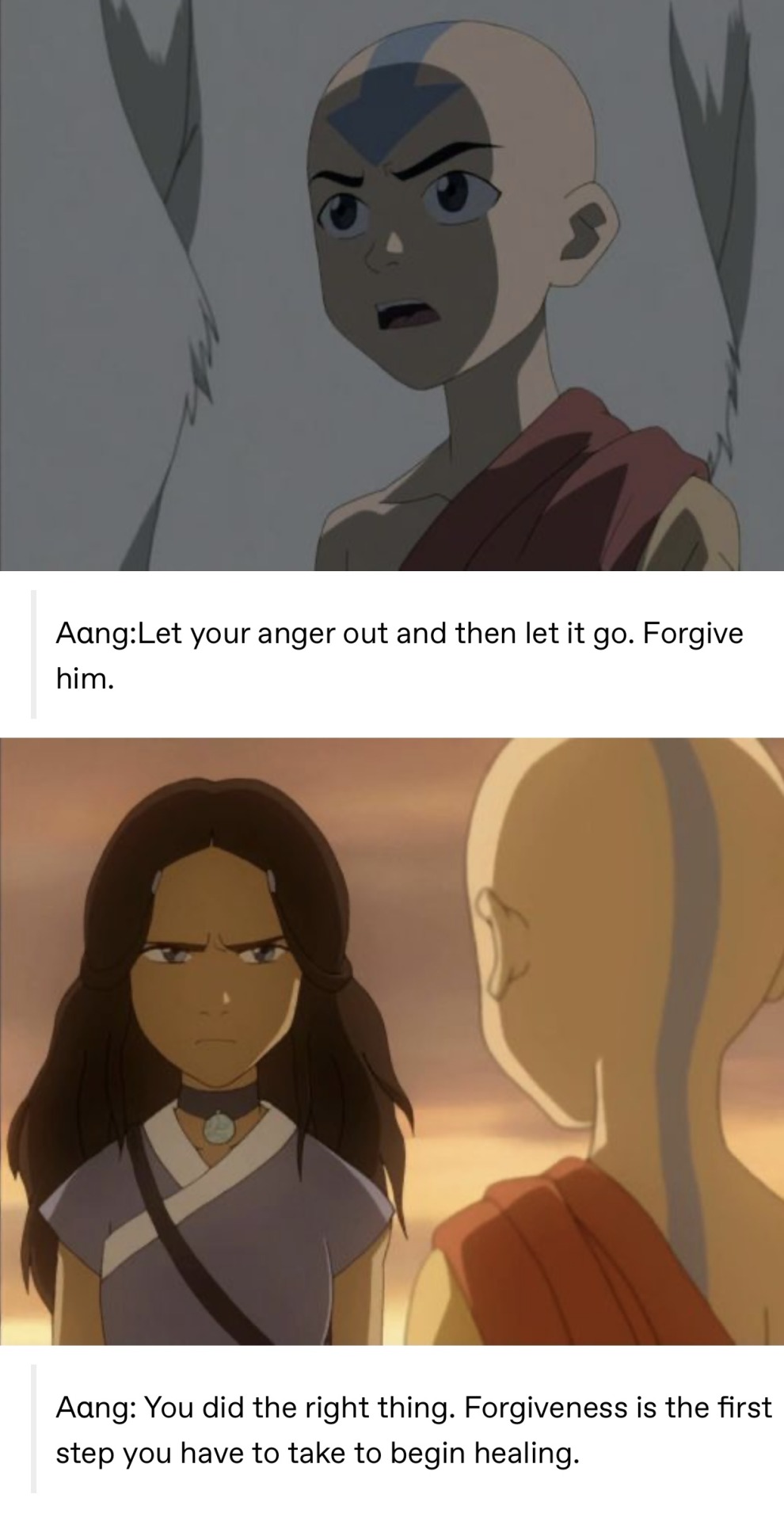
I REALLY HATE making a Katara centric episode about shipping, I really do, many people say Zuko was right Aang was wrong, or Aang was right Zuko was wrong. Neither side was entirely right or entirely wrong.
Zuko was right to take Katara to confront Yon-Rha and this was when he truly began to understand what Katara had been through and see her as an individual, while Katara comes to see Zuko as a friend and forgive him, however he had no idea what Katara was going to do and didn’t think of toll this would take on Katara if she did end up choosing violence.
Meanwhile Aang not agreeing with Katara and confronting her isn’t a bad thing, he understands just what it’s like to lose someone close to you and to feel unbridled rage and hate, he’s been there, he also knows Katara isn’t cold-hearted and she could come to regret seeking violence. He actively encourages Katara to face Yon-Rha without killing him, which she does and as Zuko says he was right about what Katara needed. But as Katara points out she didn’t forgive Yon-Rha, forgiveness wasn’t the right choice, and you know what, this is something Aang accepts.
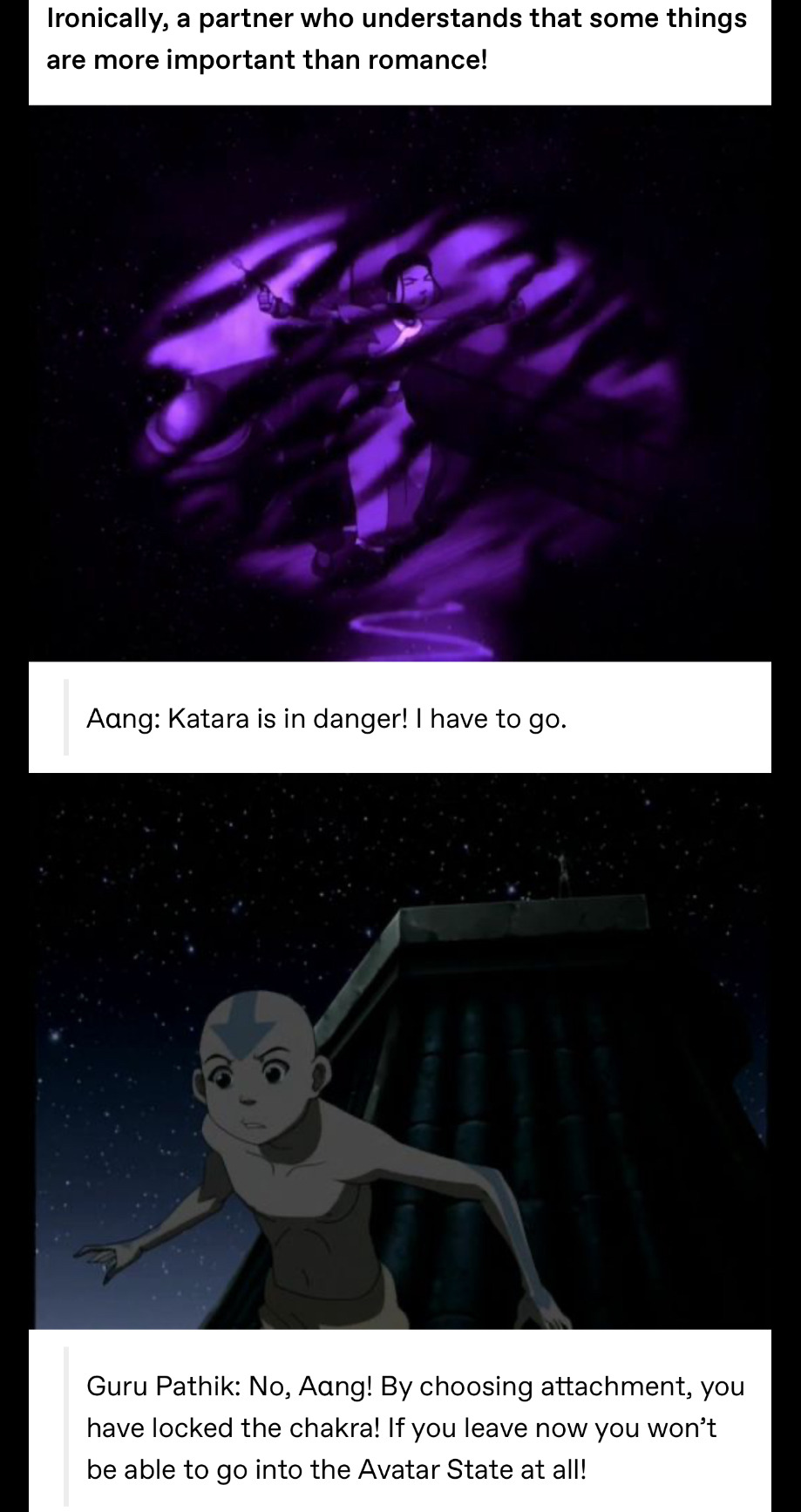
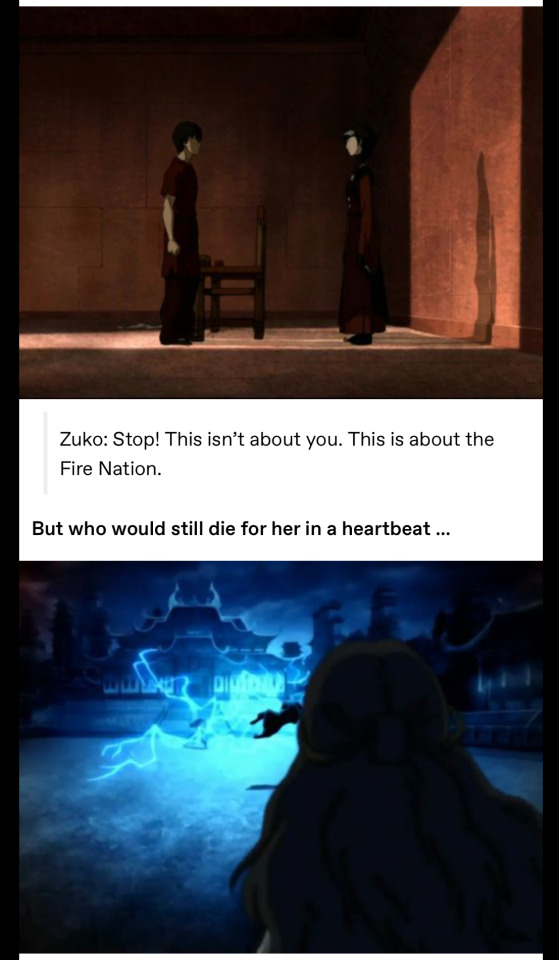
These points in particular really highlight the stupidity and hypocrisy of the OP. For one, as we can literally see Aang ignored his training specifically because Katara was in danger and he wanted to save her, this is no different from Zuko sacrificing himself to save Katara, in fact Aang has put his life on the line for Katara multiple times. Furthermore OP gets on Aang’s case for leaving Katara to fulfill his duties in the Book 3 premiere, but then praises Zuko for leaving Mai to fulfill his duties. They’re literally praising Zuko for doing the same stuff Aang’s doing and whining about Aang whether he chose to ignore his duties to be with Katara or if he leaves Katara to fulfill his duties, you can’t win!
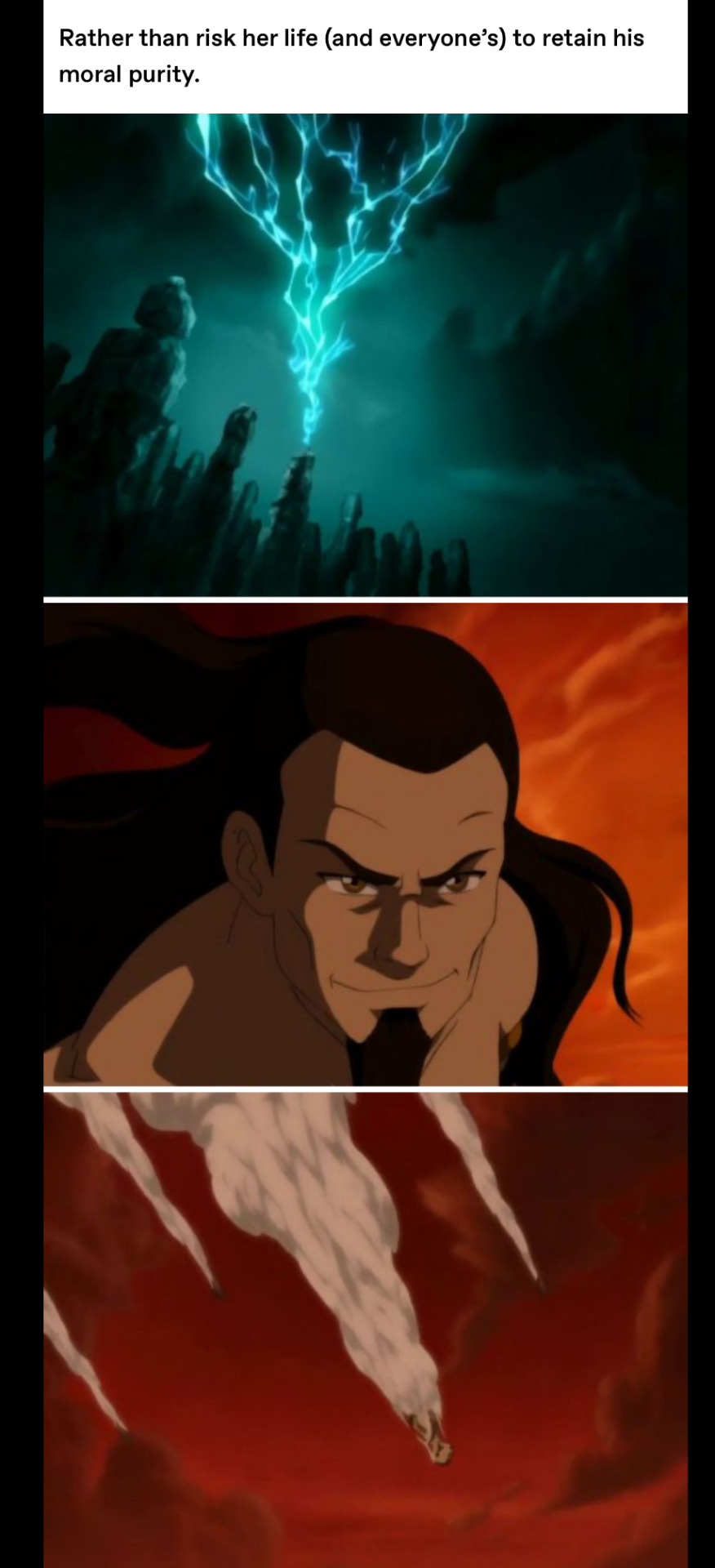
Okay, screw this guy, this has nothing to do with the Zuko saving Katara, OP just wanted to bitch about Aang not wanting to kill Ozai as if this supposedly makes him selfish even though Aang is literally facing Ozai to save the world and is simply trying to find a peaceful solution, it’s like the theme of this show was lost on this dude.
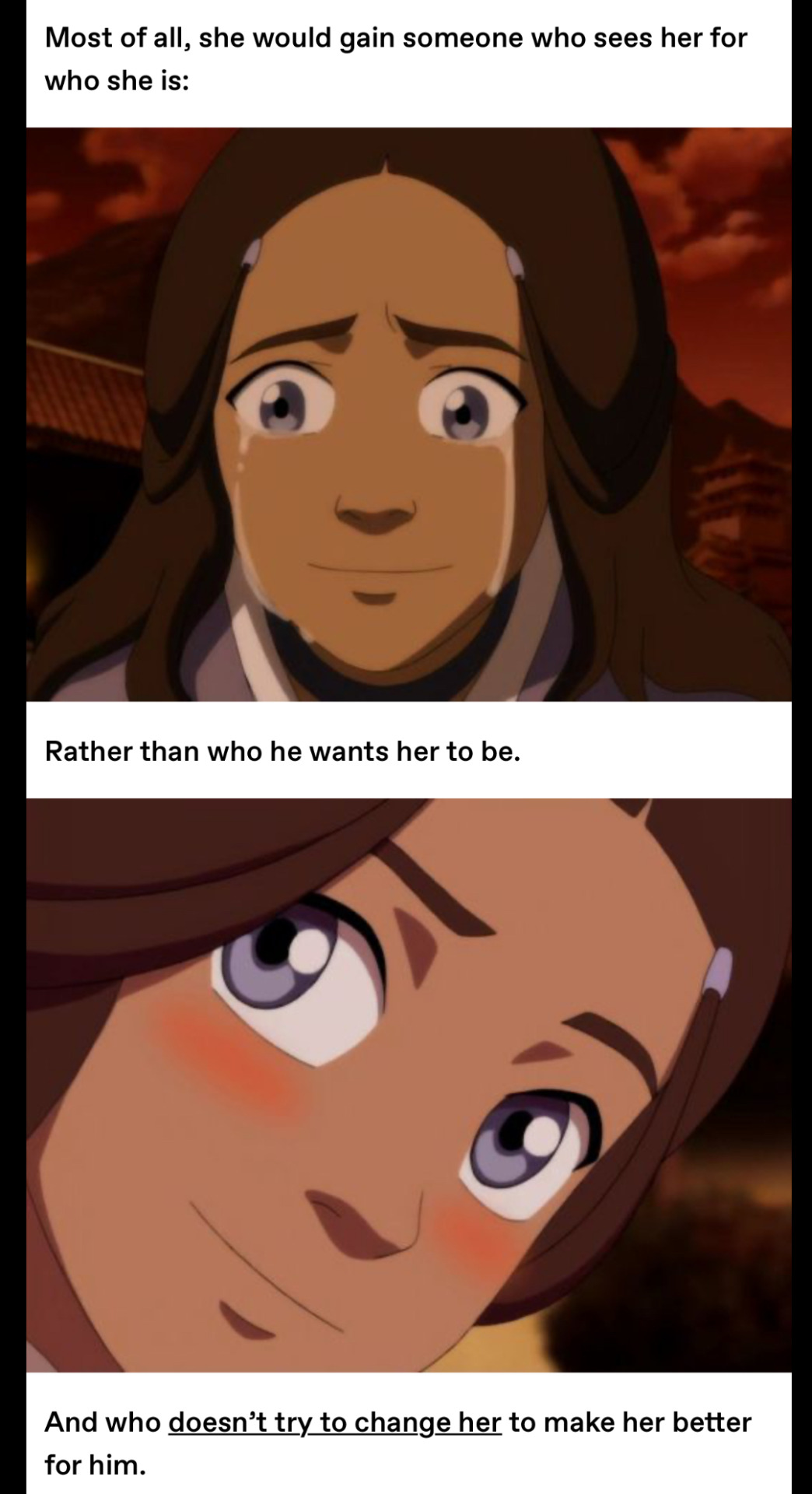
This was the creep who made weird comments about Katara’s appearance wasn’t it.
I really don’t get what this final point is trying to prove. The first scene is Katara happy that Zuko is alive, the second is Katara happily gazing at Aang, who never at any point tried to change Katara, at all. Point me to one scene, one moment. If this is about how Katara looks, she doesn’t look that different, at the very least, her eyes are slightly bigger in the second pic because she close to someone she loves, but even then it’s a lot of whining from this guy about nothing.
Case in point, this is when I realized Anti-Kataang Zutara shippers have are media-illiterate morons with not a single good take, fake-fans who only care about mischaracterization for the sake of a mid middle-school ship.
Maybe I should make a counter post about what Katara gains from Kataang.
#pro kataang#anti zutara#anti zutara stans#anti zutara shippers#anti anti aang#anti anti kataang#pro aang#pro katara#aang x katara#kataang#aang#katara#kataang defense#kataang defense squad#avatar: the last airbender#a:tla#atla fandom problems#atla fandom salt#atla fandom critical#atla fandom discourse
67 notes
·
View notes
Text
The Gaang being 'bad parents' didn't ruin their characters.
I've seen this argument tossed around a couple times and it's honestly one of my least favourite criticisms of lok.
Katara (and Sokka but we have no confirmed kids for him, which seems unrealistic with how much game he had) lost their mother as children and their father was forced to abandon them when they were barely starting their teens. They were raised by their grandmother with little to no peers of their own age.
Aang did not know his parents and a huge chunk of his childhood was him being groomed into taking up the mantle of the avatar and mastering airbending. He also was isolated from other kids his age. His closest parental figure was Gyatso who was more of a teacher than a father. Also the Air Nomads were literally wiped out so that adds to the trauma pile.
I really don't think i have to talk about Zuko's family life here, but at least he had relatively positive parental figures in the form of Ursa (though i do have a burning personal dislike of ursa) and Iroh. Despite this his struggle around the subject of his family and his trauma relating to his upbringing was a focal point of his character arc.
Toph was raised in isolation by her asshole abelist parents who did not listen to her, sent people to capture and bring her back and then disowned her. (If my cursory understanding of 'the rift' is correct, I need to actually read it because i am unreasonably obsessed with the Beifong family.)
Where, pray tell, were they supposed to learn proper parenting skills? On their brief stint as child soldiers? While fighting a war as literal children?
There is the argument that they must've matured later in their lives, of course. But you can only recover so much from copious amounts of childhood trauma.
Being a bad parent doesn't necessarily make you a bad person. Sure it makes you a failure in an incredibly delicate and important aspect of human life but it doesn't make you a bad person. And saying that it does takes a lot of nuance out of the conversation.
Like, do you know how easy it is to fuck up a child?
Especially that the ways the members of the Gaang 'fucked up' as parents feel mostly in character.
Bumi was going to face some struggles with self worth due to being the firstborn child of the Avatar and arguably one of the most powerful waterbenders in history, while being a nonbender himself. That much was unavoidable, no matter how his parents approached the issue.
And Aang was obviously going to be over the moon when Tenzin was born. Think about it. He's literally the last of his people. He has no one else 'like him'. No one else to pass down the traditions, the teachings that Gyatso and everyone else he cared about and who were horrifically murdered to. Aang is getting older and he feels like his culture and history and his entire life before he got trapped in that damned iceberg will die along with him. And then Tenzin is born and Tenzin can take up the mantle that had been thrust upon Aang.
I'm going to withhold my judgement on Izumi and Zuko, since we barely know anything about them. She seems well adjusted but that's all i can say right now. But Zuko has also been shown to be extremely, painfully aware of how fucked up his family is and has clearly been putting in a lot of work to unscrew what his ancestors have screwed up.
Toph situation feels very tragic to me,because it's obvious that she thought she thought she was doing better than her parents. She gave her daughters the freedom to do what they want, to not feel opressed and trapped like she had. How was she supposed to know that she was making her girls feel like she didn't love them? (Here's another post of mine about the Beifong family and how they just feel like they're cursed or something at this point.)
TLDR; I get annoyed by people saying that the Gaang being 'bad parents' ruined their characters, because to me it felt like it actually enhanced them.
Neither Aang nor Toph acted out of malice or a lack of love. On the contrary, Toph was trying not to repeat her parents mistakes, accidentally committing a bunch of her own. While Aang probably didn't even realise that he was neglecting Kya and Bumi.
But just loving your children doesn't always make you a good parent.
I think these flaws only add to them as characters. It makes them feel more real.
It's unrealistic and, frankly, just plain boring to go 'oh the Gaang were all good people so they would be good parents too.'
The Gaang were a gaggle of traumatised children forced into saving the world, because the adults around them failed them, that then grew into traumatised adults who have no idea how to be good parents.
#badly voicing my thoughts#avatar legend of korra#i know i did not write this out correctly but it is like 3 am and i am tired and mad and stressed#avatar#avatar: the last airbender#the last airbender#legend of korra#aang#avatar aang#katara#sokka#toph#toph beifong#zuko#ursa#iroh#bumi ii#kya ii#tenzin#firelord izumi#lin beifong#suyin beifong#the beifong family#the beifongs#wow look at all these traumatised people
421 notes
·
View notes
Text
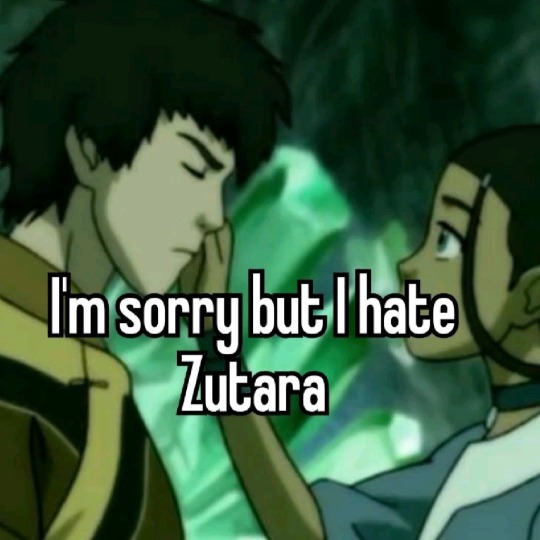
I’m pro-delulu and I too believe in shipping characters that don’t canonically end up together BUT… I will never get behind Zutara (my mind changes often, but rn no🙅🏽♀️.)
Maybe it’s because I don’t take colonization and eithnic clensing lightly, or maybe it’s because I disagree with the “Katara is like Aang’s mom” statement. Either way they should not be end game. People often bring up how Zuko helped Katara release a lot of pent up emotions concerning her mother’s death and who killed her, but the Fire Nation (his people) were responsible for that death. And up until that specific arc Zuko was upholding the beliefs of those people.
“Zuko doesn’t need Katara to be his mother like Aang and the rest of the group do, they’re on equal footing.” Except Aang and the rest of the group don’t need Katara to be mother either. People just view Katara as a maternal character because of her personality and that’s the only role they’ll acknowledge her having in the group. Katara’s mother showed her a love so deep and protective that she died so Katara could live. Of course the trauma of losing her mother in that way at such a young age would cause her to take on the role her mother had. Whether it be because of obligation, or simply because that’s all she knew.
Aang and all the other characters have experienced a lot of trauma, but Aang was raised by monks. He doesn’t need a mother figure because he’s never experienced gender roles in the way the other characters have. His idea of a family is being shaped as the show progresses because aside form Monk Gyatso, they are the first real family he’s had. He’s curious, fun-loving and light hearted because that’s how Monk Gyatso raised him to be, not because he’s an irresponsible little 12 yr old without a mother. His people were eradicated, so Katara doesn’t raise Aang she guides him through grieving the loss of his people. A loss she knows all too well.
Toph is blind and her family is overly protective. They don’t give her the space or freedom to be her own person or earth bend. Another experience that Katara knows all too well. Her grandmother never let her leave the southern water tribe or water bend so she gives Toph the same thing she gives Aang. Sokka is Katara’s brother… he also experienced the loss of their mother except Sokka is a boy. He’s been made painfully aware of gender roles because he watched their father leave to fight in the war instead of staying to help him and Katara. He wanted to be more like his Father because be believed that was his role in the family (to fight). So the responsibility of taking care of the both of them fell on Katara.
Katara and Zuko are not on “equal footing” especially not before he leaves the Fire Nation. He’s a prince from the Nation that has been opressing her family, her people and the world for 100 years…(he literally calls my good sis “water tribe peasant” meaning at some point he believed she was inferior because he had royal blood.) He has changed now of course and I love both Zuko and Katara, but them being end game makes no sense to me. Even in terms of chemistry… I don’t think they have any at all. Majority of their screen time together is just them fighting with each other (verbally and physically.)
People also like to use the episode where Zuko takes Katara to find the man who killed her mother as proof that Zuko was the only one who truly helped her grieve and get closure. Which honestly I don’t understand. I think he definitely aided in helping her move past what happened, but it could’ve went painfully wrong & I think it was a bit misplaced. For one, Zuko’s whole reason for doing that was to get on Katara’s good side. He said himself that everyone else had forgiven him already except Katara. He understood that his role in the group was teaching Aang to fire bend, and helping the gaang defeat his father. Which is why he couldn’t grasp why she wouldn’t put her personal feelings aside for the sake of the team. He needed to gain Katara’s trust for the sake of better team work when they fight. Katara was also extremely hypocritical that episode, and spoke from a place of anger and hurt. Aang wasn’t invalidating her feelings, he only did for her what she’d done for him. He reminded Katara that her rage and anger needed to be fueled into defeating the Fire Nation, NOT revenge. Because revenge doesn’t help you grieve & it wouldn’t help them achieve the REAL goal. {Not to mention she was so disappointed and upset with Jet for wanting revenge (a character who truly reflects her), but because the man she was going to kill wasn’t innocent somehow her revenge was different and therefore justified?…No.}
Katara would tell Aang all the time how much seeing him so enraged in the Avatar state genuinely hurt her. Yet for some reason she couldn’t fathom that he’d feel the same way seeing her blood bend in the same emotional state? No…I think in that moment she just didn’t care & wasn’t thinking about it. Zuko was counting on that, and he used Katara’s pain to get her to trust him (it was smart and it worked but still not cool.) Zuko understands Katara’s pain to an extent, but it’s not the same at all. Zuko’s mother was banished, but Katara’s mother was killed… and by Zuko’s nation at that. The only people in the group who TRULY understand Katara and that pain… are Sokka and Aang.
Aang and Katara to me are like 2 halves that make a whole. Their characters are tailor made for each other and I love it. I’ve believed they were soulmates since the moment she broke him out of that Iceberg. Katara felt a higher calling, not only to be a water bender fighting for her people, but also to be apart of something bigger than herself, fighting for everyone. Her first time experiencing freedom is when she was took on a mission to give that same freedom to others around the world as well. Its not a coincidence that in the first episode where she feels her biggest emotions, she showcase her strongest bending yet at that time in her life, AND she broke THE Avatar out of an iceberg he had been in for 100 years. It was FATE. Katara helps Aang grieve, gives him a family after losing the one he had, teaches him water bending, teaches him that the world may be counting on him, but the amount of death and pain he sees is not his fault and most importantly teaches him how to use his power to stand up for and fight for the people who can’t fight for themselves. She shows up when he needs her the most. Aang also helps Katara finally step into her own power. His arrival gives her the things necessary for her development… freedom, fun, opportunity to master water bending, a new addition to the family after the loss of her mother, and a partner in justice. The way Katara is capable of truly seeing and understanding Aang, speaking to his soul when they had just met… reflects how meeting him helped her heal. They connect so much because despite their differences they understand each other. Some of Aang’s own words were “Why would i choose cosmic energy over Katara?” He had an opportunity to master the avatar state land directly in his lap, but instead he chose her.
IM TEAM KAANG TIL I DIE
Also I think personality wise Zuko and Katara are too much alike for it to work romantically imo. They’re both sassy as hell, sarcastic, stubborn momma’s babies, who resent their fathers a lil and went through hell for a couple years because of their siblings (+ losing their moms.) In some ways they ARE opposites (especially their bending & colors,) and i agree they have character development arcs that fit together like puzzle pieces…BUT they are more alike than they are opposite. I absolutely LOVE both characters, but I fear people look at Zuko with rose colored glasses on alot of the time. Especially when it comes to Katara. Zuko did what needed to be done for the world’s sake, but he’s no super hero when it cones to Katara and she has a deep wound related to getting revenge on people people who harm her family. The main reason Zuko broke her trust in the first place was because he helped Azula kill Aang after letting Katara believe he was on their side… Aang is her family It was never about her mother when it came to Zuko’s forgiveness. She even said she would kill him if he even thought about hurting Aang when he first joined the gaang.
With that being said… I don’t have a problem with people who just like to see them together, but pls stop with the justifications because… It genuinely makes no sense to me at all.
#katara#avatar aang#aang#atla#kaang#zuko#prince zuko#toph beifong#atla sokka#avatar the last airbender#ships
91 notes
·
View notes
Text
just some zukki thoughts
Sokka kissing Suki at the boiling rock, melting into her arms, feeling the way she hugs him so close. She’s alive. Of course she is. Suki is strong.
Zuko is standing behind them, shifting awkwardly when Suki notices him. He hasn’t gotten to talk to her… ever really, but especially not after the whole… burning down Kyoshi island thing. Suki raises her brow at Sokka and he just shrugs. Suki just nods, taking that as the only answer she needed regarding Zuko.
Zuko has never been comfortable with touch or proximity. Lu Ten, Uncle Iroh and Mother were the exceptions, but, they’re gone now. So, he should hate it. He should hate that he’s squished in between Sokka of the Southern Water Tribe and Suki of the Kysohi Warriors, two people that hate him, but. . . he doesn’t. They are currently in one of the coolers, one that Zuko himself was in only a few hours ago.
He doesn’t favor the way Sokka’s elbow juts into his ribs, but he doesn’t mind the closeness. It’s almost nice. Almost.
Hakoda is there too, being the entire reason Sokka and Zuko came in the first place. He eyes him intensely, with a look that Zuko can’t quite decipher. He glances between the three of them, seemingly in thought before nodding to himself. Zuko blinks, clearly not understanding what Hakoda’s thought process could be other than planning to throw him into the boiling lake.
He shrinks down further, avoiding the man entirely, willing himself to disappear.
He doesn’t speak for the entirety of their cruise. He listens as Sokka quietly recounts what happened after they escaped for the first time on Appa. He explains why Zuko is here now, how he will be teaching Aang fire bending. Zuko can only nod, not willing to look Hakoda in the eyes.
“And we’re sure we can trust him?” Hakoda says, not unkindly.
Zuko goes to speak, to ramble about how he’s changed, that he spoke out against his father but Sokka beats him to it.
“Of course. He’s the one that helped me rescue you.”
He says it so matter-of-fact that Zuko wants to scream. He feels the way his cheeks start to burn and prays to Agni that it’s only the steam from the lake.
“Okay.” Hakoda says, trusting his son implicitly. Zuko’s mind blanks, eyes widening, how was this so easy for them. How did this trust without a second thought? A part of him wants to yell that they are weak, gullible and the reason they are in this situation in the first place. The other part of him, however, wishes he had that. Hakoda and Suki trust Sokka, not him.
He doesn’t expect them too, not after what he’s done to them, not after what he did to Katara. She was so willing to help him, to heal his scar, and he was so blinded by the thought of getting his father’s love back, he threw away that chance. That chance of friendship. Of trust.
Katara can’t look at him. He can tell Aang is struggling when looking between the two of them. He wouldn’t blame Aang if he told him to leave and to never come back.
Aang is the Avatar, and he’s focused on making the right choice, thinking in-depth about his options and the risks he’s taking. Zuko admires him, truly. He’s come so far since their first meeting at the South Pole. Zuko winces a bit at the thought, and only hopes that they, and Agni, can forgive him. If not that, trust him not to hurt them anymore.
Although, Zuko doesn’t know if that’s an option anymore after what happened with Toph. He hates it. He hates that he was scared when she came to talk to him. He burnt her. She has forgiven him, but Zuko has not forgiven himself. He has to earn that forgiveness, he knows that.
Sokka is the one person that Zuko can’t quite understand. Sokka should be furious with him, and he was, for a while, but now he’s talking to Zuko, showing him useless things, putting his trust into him.
Zuko isn’t sure why the thought of breaking Sokka’s trust makes him so sick to his stomach. Suki too, for that matter.
#atla#zuko#avatar the last airbender#sokka#zukki#suki#zukka#drabble#thinking many thoughts#god they are my everything#ignore any mistakes#part 1???? maybe i’ll continue this
121 notes
·
View notes
Note
How is Aang a terrible friend? Genuine question. I know he’s a mess in regards to katara and his family, but I never heard anything about him and his friends
There isn't much to hear about him and his friends, is there? He's friendly and likable and that gets him surrounded by friends who themselves are selfless and brave. That makes him look pretty good by association, but the deep, character shaping moments he's a part of are to his benefit. He has all these great friends to turn when he needs them, but who turns to him when they need comfort? The strongest showing I can think of that he had as a friend was sneaking to teach Katara waterbending when she was refused. That lasted right up until he was confronted by Pakku. Then Katara stood up to Pakku and called him on his stupidity, and Aang instead of standing ten toes down for his friend told Pakku she didn't mean it. Like consummate people pleaser he is. Katara fought that battle alone.
Let's not forget the way he literally blew up at his friends in the desert when Appa was kidnapped. Don't get me wrong, his being upset was completely understandable, but a good friend would apologize for that. Toph especially didn't deserve that for him, and she never gets an apology.
Aang is a terrible friend for the same reason he's a terrible partner and father. He's selfish. He receives way more than he gives. Yeah, he's cheerful and fun to be around, but that doesn't make him a good friend. Toph is a better friend, and she hardly gets any of her own story on screen.
111 notes
·
View notes
Note
Bless you for creating this blog, because I need to VENT
(obligatory not all Zutarians who want to enjoy their fics and arts in peace. you guys are cool and chill.)
Isn't it so interesting transparent and sad that every Zutarian critical analysis about "making the show better" is just about making Aang suffer more, and Zuko look good?
Katara should have kept her burn scars, because Aang needed to understand the consequences of his actions!
Right. Because immediately apologising, and becoming so guilty he doesn't fire bend for 2 seasons doesn't show remorse.
Aang should have given up his attachment to Katara to become a fully realised Avatar, otherwise he doesn't sacrifice anything! That would have been narratively satisfying!
Right. Because LOSING HIS ENTIRE CULTURE AND EVERYONE HE EVER LOVED isn't a "sacrifice". Which he will never get back. He'll have to live with the tragedy of being the last Airbender forever.
It's SO interesting how Zuko literally gets everything he wanted- locking up Ozai forever, getting a new father figure in Iroh, becoming Firelord, being with the woman he loves, finding his mother, even finding a new sister who adores him. His ONE tragedy is Azula, and even then she's hopefully on a journey of redemption.
But somehow that's not the "perfect ending" for Zuko. Nope, the only narratively satisfying ending is if Katara falls over to suck Zuko's dick.
So Zuko doesn't sacrifice anything permanently, and he literally gets everything he ever wanted. Aang will never get back what he lost, but apparently he has to give up Katara too. Funny how that works. Can you make your seething resentment any more obvious?
It's also amazing to me that so called Katara stans NEVER think about how KATARA would feel if Aang lost his romantic attachment to her. Girl hugged him several times, kissed him on the cheek and lips, blushed around him, threatened to murder Zuko if he hurt Aang...she was not subtle. But apparently no one cares about Katara's feelings.
Also, how GUILTY would Katara feel if Aang had to sacrifice his romantic attachment to become the Avatar? Do you think she'd be happy he had to sacrifice love for duty? Which BEST FRIEND would be okay with this situation? Even Sokka and Toph would be outraged.
If my best friend and fellow genocide survivor had to sacrifice his romantic attachment for duty, I'd be so mad I would murder Ozai myself. Yes, even if I didn't love him back, because HE'S MY BEST FRIEND. Nobody would even be able to find the body.
Katara and Zuko should have gotten together, that would have fully represented the themes of balance and redemption in the show!
FFS THERE IS A RELATIONSHIP THAT REPRESENTS THESE THEMES! IT'S ZUKAANG! SORRY YOU WERE TOO STUPID TO UNDERSTAND THE SHOW!
Sorry, Sokka. Your relationship with Suki is toxic, because she's from the Earth Nation. You need to break up immediately. Better go find a nice firebender to have children with! Zukka anyone??
Did they miss the part when Uncle Iroh said, "Understanding others, the other elements, and the other nations will help you become whole."
Or the Guru when he said, " Even the separation of the four elements is an illusion. If you open your mind, you will see that all the elements are one. Four parts of the same whole. "
AKA "balance" is when we learn from all 4 elements and grow as a person!!! It's got nothing to do with love!
BECAUSE PEOPLE CAN'T BE REDUCED TO THEIR ELEMENTS! THAT'S THE THEME OF THE SHOW!
Sorry, Katara. You represent water, and Zuko represents fire, so you have to marry each other for "balance". It's in the rules. How convenient.
Even though Aang is ALSO a fire bender, so marrying him would also represent "balance". But he doesn't count because he's not hot and sexy like Zuko with his anime hair.
sidenote - Aang is so hot. With his muscles , grey eyes, and his off-shoulder fit? Divine. Zutarians who think Aang isn't sexy have no taste.
sorry for the extremely long rant. I just couldn't take Zutarians and their "atla-critical" analysis anymore. It's the self-righteousness that gets me.
They can't just say, I love Zutara together because I like their dynamic. Instead they have to write long metas justifying why their ship is the "only one that strenghens the themes of the show" and Kataang / Maiko "weakens the narrative" and other bs.
thanks for this space, this was cathartic.
You're welcome, anon 💖
45 notes
·
View notes
Text
another reason i dislike the way this conflict is written is because it opened the floodgates for certain parts of the fandom to really mischaracterize others—namely, sokka and zuko.
some of it is light-hearted and, i think, not ill-intentioned. jokes about them being more okay with killing abound in the fandom, though, and while there’s a kernel of truth to them, i think they often ignore context.
and of course, there are people i feel speaking in much worse faith, criticizing them both for “bullying aang” over it and insisting they’re morally wrong to suggest aang needs to kill ozai.
but once again: context. they are harsh because the situation demands it. neither of them know another way (and by the way, neither does aang or the audience at this point) to defeat ozai, and if they don’t defeat ozai, the earth kingdom will be destroyed and the world will collapse.
people talk about zuko and sokka like they’re bloodthirsty killers, just, a-okay with killing no matter what the situation, but they’re not.
sokka is a pragmatist. he has never been a killing for killing’s sake guy. when he wanted to leave zuko to die back in the siege of the north, sure, he hated him, but that’s not why he wanted to leave him. zuko kept chasing them. it would simply be less dangerous and make their lives easier to leave him behind. sokka killed combustion man because he wouldn’t back down even when the guy who hired him was trying to get him to stop, so there was very clearly no reasoning with the guy, and they would have died if they hadn’t stopped him. likewise, sokka kills the soldiers who are approaching him and toph as they hang from the airship in order to protect himself an to protect toph. he kills in situations where he and his friends would have died if he didn’t. and it’s frankly uncomfortable that the rhetoric here is the main dark-skinned boy in the cast is unnecessarily violent when that’s never been his MO.
for his part, the narrative actually goes out of its way to show zuko is not someone who has the stomach for killing, whatever he tries to tell himself when he’s still a villain. as early as episode three, he can’t even being himself to burn zhao at all during their agni kai, let alone kill him. similarly, after attacking zhao in the siege of the north, he chooses to offer his hand. in his fight in zuko alone, most of what’s doing is fighting defensively, and even when he gets back up in a flurry of flame at the end, he doesn’t strike to kill gow, only incapacitating him. even hiring combustion man, while absolutely wrong of him to do, shows him not having the stomach to go through with it himself. and despite having every reason to hate ozai, when ozai tries to kill him in the day of black sun, zuko doesn’t strike to kill him as he redirects the lightning, instead aiming below him because he believed it’s not his place to kill ozai and because he’s learned not to be goaded into violence, which is powerful in itself. him advocating for aang to kill ozai is because he doesn’t see another way out (and, as established, how could he?) not because he’s out for blood in general. it’s complicated, of course, given his history of abuse with ozai, but that’s why zuko is so determined, because he’s finally realized who his father is and how much harm he’ll do if he’s not stopped.
as frustrated as i am by the fandom rhetoric around zuko and sokka when it comes to this, though, at least they get to express their misgivings and perspectives.
interestingly, i’ve not often seen katara get quite the same treatment—not that i want her to, but it’s interesting because katara tries to express her concerns, and aang and the narrative don’t really let her.
she says, “aang, we do understand, it’s just—“ but gets cut-off before we can hear her perspective at all. if i had to guess, though, it would have been something like “it’s just that we have to stop ozai no matter what”, which is, in essence, what zuko and sokka are also saying.
but katara doesn’t get to. at once, the creators makes sure she isn’t allowed to verbally disagree with aang (despite showing she wants to) here in a way that has a lasting impact on how people remember her own perspective in this conflict, while also making sure she gets interrupted, yelled at, and blamed for not having an answer aang also doesn’t have. it’s just… it’s very frustrating.
#atla critical#long post //#ask to tag //#aang critical#atla rewatch ‘24#fandom critical#sozin’s comet#sokka#zuko#katara#racism //#misogyny //
66 notes
·
View notes
Text
to me, zuko’s relationship with toph is so antagonistic on his behalf because she’s the one member of the gaang (outside of suki who he simply doesn’t consider to be in the gaang tbh) who he least empathizes with, at large and in relation to her trauma. the reason for this is that unlike aang’s, katara’s, and sokka’s traumas which he sympathizes with + connects his trauma to in various ways of arguable aptness, zuko is uncomfortable with the striking closeness of toph’s trauma to his because of how class and privilege factor into their both of their trauma. aang, katara, and sokka are not privileged in any real way, esp not one that reminds him at all of his situation re status and privilege.
zuko finds aang, katara, and sokka's trauma relatable on a level that makes him feel equally victim of the fire nation; that's why he draws lines between kya being murdered in an ongoing genocide to protect katara and ursa, who was certainly not anti imperialism from anything we've seen of her, disappearing to protect him from his abusive father and grandfather. both situations are unpleasant and involve maternal sacrifice, but one is a domestic ordeal while the other is an act of racial violence and genocide. the connection exists, but the context is radically different. still, zuko likes that he can draw those parallels between his trauma and katara's. it allows him more room to feel like a better victim and arguably a bigger one in the context of the war, despite the fact that his status means he did in many ways benefit from his family and country being the perpetrators of it and his own personal role in it throughout books 1, 2, and 3.
i will give the obligatory disclaimer that zuko is a child soldier and he does side with the oppressed in the end, but he himself is not oppressed by the fire nation's genocidal war as a fire nation prince, let alone when he is the fire nation crown prince. he is someone who directly benefited from this war. yes, his father was abusive, yes, he was exiled for 2 and a half years, but he was still afforded many privileges because of the war. that does not negate his domestic suffering or his political exile, but those privileges still came about because of the suffering of others, including the gaang.
this is a nuanced situation. it is extremely complex and hard to accept the simultaneous truths at play here, even for adults, let alone for an extremely traumatized, black and white thinking 16 year old boy. zuko needs to be a victim in the context of the war as well as his family to alleviate his guilt about his participation in it prior to joining the gaang. he needs to relate his trauma to theirs. i will say that he doesn't ever seem to attempt this with suki nor does she offer her trauma to him, but that's more about both the writers and zuko not caring much if at all for her as a person.
but toph receives clear rejection from zuko when she tries to relate to him. her attempts to endear herself to him and to open up to him are shot down. why? surely toph suffered because of the war too. she's from the earth kingdom. but she never suffered a personal loss that zuko respected or related to. toph is not given any dead relatives. she was abused but not in a way zuko would understand, and her abuse did not negate that she lived a relatively comfortable life for being in the earth kingdom during the war. she was rich, she was cared for, she was shielded by privilege in many ways. while zuko is of course far richer than toph, he doesn't want to confront that reality. he doesn't want her privilege to make his obvious. he needs to focus on his suffering, his abusive father, his struggling to fit in as heir, and his time in exile and poverty. he can't accept the idea of those struggles coexisting with his privilege, so he can't accept the idea of toph's either. she has to just be whining about nothing. she has to be a nuisance not to be taken seriously. otherwise, he has to turn and face things about himself he doesn't want to be true.
could he grow to care about her and face his own privilege in the future? sure. but he doesn't in canon.
#atla#zuko#toph beifong#zuko critical#maybe? idk i don't dislike this abt him as a character i think it's really interesting#but it is a shitty thing to do to a 12 year old like omg let her live
106 notes
·
View notes
Text
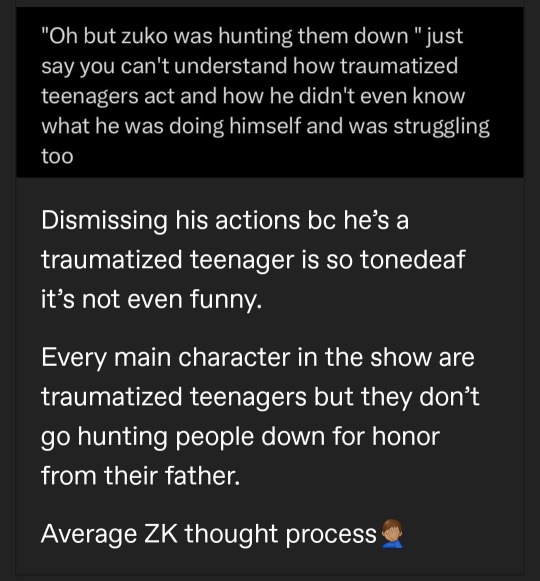

Alright let's break this silly argument down a bit shall we?
First off, yes, everyone in the Gaang has trauma. We know this, and we don't disregard that. We know that Sokka and Katara have trauma. We know Aang has guilt over what happens with the Air Nomads when he ran away. We know Toph has baggage because her parents kept her confined because of her disability. That's all been established.
Comparing trauma does not work in anyone's favor because it's different from person to person and the way that it's treated. Hell, there are FOUR types of PTSD and not all of them have to do with existential circumstances. Some of these types have nothing to do with being in a situation that causes panic.
But it's how we deal with our trauma that sets us on the path to healing.
In Katara's case, she had some pretty severe Survivors Guilt. Not necessarily PTSD, but it could be argued that she does have that. It changed her life irrevocably and that is something she had to deal with. She does get to deal with it in TSR but this leads to conflict between her and the group because there is this perception of her that isn't really her.
Sokka has to rise above his issues with being a non-bender and feeling left out. I also feel like he hides a lot behind his humor to deflect how he really feels about things. This is what happens when you have anxiety about meeting expectations. He has expectations he has to fulfill, and it never goes right. He's afraid of disappointing people he cares about and doesn't want to let them down. He isn't a failure, but when he does actually do something amazing, there is Imposter Syndrome. We don't see it much, but we do in NAtLA.
I'm not going to talk about Aang. I refuse.
Toph has been sheltered her whole life because she is blind. She is at home with herself, but she doesn't like anyone to do anything for her. She eventually learns that it's okay to have help when she needs it and that it's okay to have friends. (Not comparing trauma here, but she has the minor character arch out of all of them)
Zuko is... a lot to unpack. At the beginning, we know next to nothing about him except that he is the Crown Prince of the Fire Nation, and he's hunting the Avatar to reclaim his 'honor'. He's hot-headed, but we never actually see him hurting anyone. He threatens, but he doesn't want to hurt people. That's the first sign that things aren't all they seem with Sifu Hotman. Throughout book one we get to know him a little better and see that he is Banished from home because of a 'misunderstanding' and he was also brutally abused by his own father. In the Netflix Adaptation it's more nuanced at how Ozai is playing his children against each other for his own benefit. It sucks but it's also good writing (some of the best writing is done with the characters of the Fire Nation) but anyway, we get an understanding of where Zuko's trauma comes from.
He has been emotionally abused by his narcissistic sociopath of a father because Zuko didn't have that 'spark' in his eyes at birth (not the entire reason but I'll get to that in a bit). Azula was the Prodigy, so Ozai put all his focus on to her. Then, his mother literally killed Azulon to save Zuko's life, but he doesn't find out until later. All of that plus the Agni Kai against his father is why he is so invested in finding the Avatar. Ozai seemingly took everything away from Zuko, but Zuko still loves his father and his people.
So why is he chasing the Avatar? Because he wants to go back to everything he knows. It's not just about getting back something that was never really taken away, it was all about getting back everything Ozai took from him.
Zuko never lost his honor, but he had everything else stripped from him and was humiliated for it.
He eventually grows through this and begins to heal himself with confronting Ozai on the Day of Black Sun. That was when he said 'fuck this shit I'm doing this my way' and that royally pisses Ozai off.
So if you don't like that our argument has better standing than yours, I suggest you go take some creative writing classes and learn about character development.
#fight me on this and youll lose.#it pays to go to college#adult opinions here#zutara#pro zutara#pro zuko#character development
54 notes
·
View notes
Note
hey there! can i ask you to elaborate on something?:)
when you reblogged the scene from 'the firebending masters' ep where aang and zuko are judged by the dragons, you said that "now they stand beside the person they thought had what they most longed for" in relation to their yin/yang dynamic.
i remember zuko's monologue in 'the siege of the north' about how aang is like azula and things come to him easy - something that zuko may feel jealous of and long for. but in what sense do you think zuko has what aang longs for the most, and does he acknowledge this?
Such a good question referencing this post and these tags:
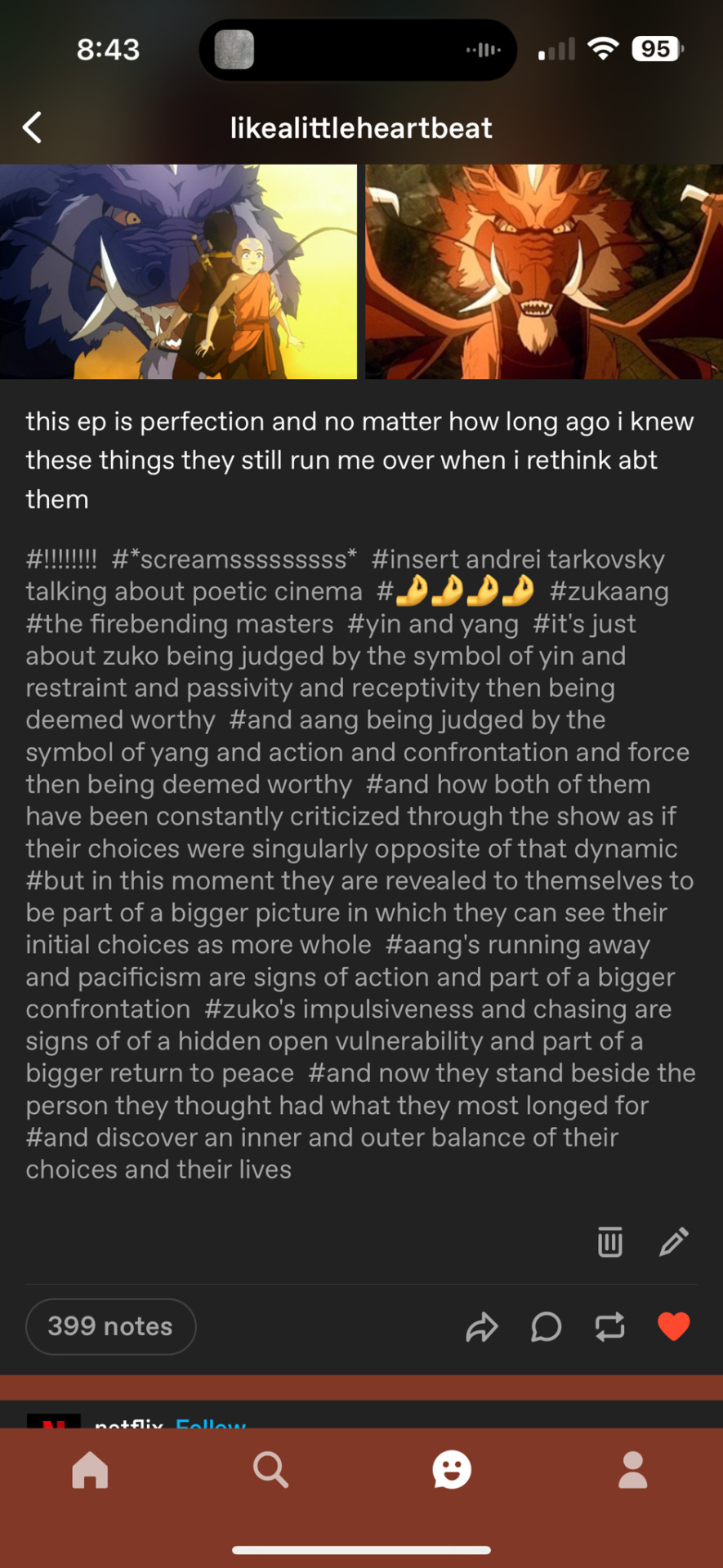
First, I’d say that when I talk about longing here, it’s not conscious longing, it’s a deeper subconscious longing for that which will resolve their inner conflict but the character has not necessarily articulated it for themselves or even come to the conclusion themselves. @avatarsymbolism has a nice little post about zuko and aang’s wants and needs. And while I don’t agree whole-heartedly with the wants and needs they land on for the characters—Aang’s need to “mature and step into his role as Avatar” is clearly more nuanced since the Avatar state he masters at the end of season 2, as mentioned in the post, ends up getting him killed rather than serving as a narrative culmination—the framework of wants and needs with the initiator of a characters’ “lie,” which might be better understood as a character’s misunderstanding, is a nice way to discuss it. What I’m talking about with longing is their need.
Therefore, Zuko’s longing is not for the prodigiousness of Azula and Aang. That’s his want. What he needs is restraint, patience, and openness. What the framework of wants and needs hides, however, is something atla does incredibly well. The characters already possess and have demonstrated the features they need, just as an aspect of yin exists within Yang and vice versa. It resists the theory that desire is created by a lack. The problem is not in the characters’ ability but in their awareness of themselves and the bigger picture, the grand design. “Destiny? What would a boy know of destiny?” Jeong-Jeong asks in the episode that directly follows the Storm and the Blue Spirit which have paralleled and intertwined Aang and Zuko. “If a fish lives its whole life in this river, does he know the river’s destiny? No! Only that it runs on and on, out of his control. He may follow where it flows, but he cannot see the end. He cannot imagine the ocean.” The understanding Aang and Zuko reach in the dragon’s fire is their ocean. Zuko finally understands that his dogged pursuit of the avatar and his honor and all the failings to be self-disciplined towards the rules of his father’s court were related to his own values of restraint, patience, and openness to others’ lived experiences. He can finally see a vision of himself that is integrated rather than lacking.
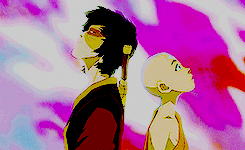
Aang longs for an inner drive, a motivating force, a reason to live and, most importantly, to act decisively that belongs to him rather than the expectations of others for him. Zuko’s clarity on his desire for his honor provides such a stark contrast to Aang on this point. All Aang can manage to do is try to avoid and escape the mantle placed on him while barely even receiving a chance to consider self-determination. The lack of a motivating force is compounded by his survival of the genocide—why go on if no one remains who can understand you? why do anything if it can’t undo the loss?
He is teased by Bumi: “Typical airbender tactic: avoid and evade.” It haunts Aang’s arc as a criticism of his approach to life. He blames himself for running away and leaving his people to suffer the genocide without his protection. He is criticized for fooling around rather than being more direct in mastering the avatar state. He is told to stop thinking like an airbender by Toph in order to master earth—“there’s no different angle, no clever solution, no trickity-trick.” And then he doubles down on himself when he dies and feels that he’s abandoned the world again.
When he reawakens on the ship, we get another parallel to Zuko as Aang asserts a desire for honor, but the goal collapses into the stormy ocean with Aang before the end of the episode. Aang would like to be determined in the same clear way as Zuko, but he keeps having to face his inability to embody that the way Zuko does.
In “the firebending masters,” Aang finally starts to understand that his fleeting nature has an underlying motive. The nomads philosophies resisted the pressures of honor and productivity important to others in order to emphasize the illusion of separation, the potential for unexpected joy, and the inherent value of life. This openness is a drive itself, Aang realizes finally, though its action seems like inaction to others. All the dodging of attacks and duties Aang performed had a greater purpose to render freedom and reconnection, as if an invisible thread had been trailing behind him stringing all the places and peoples he met back together, across distances and even across death and time. He is finally allowed to find his own reason.
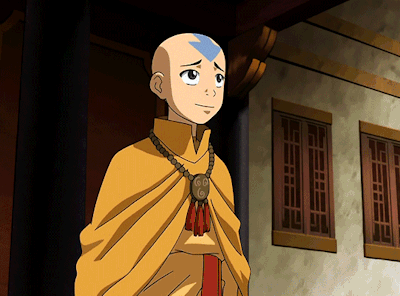
37 notes
·
View notes
Text
Motivations

So for the longest time I had a small issue with Legend of Korra. For one reason or another, I could never connect with this cast of characters the same way I could connect with the cast of Last Airbender, and I could never figure it out why.
So I went to look up some discussions here and there about how people felt about Korra, why does it feel so different from Atla, and basically try to help me understand why I felt the way I felt... And I think the reason for that was the way motivations were handled in this series.

(The following is entirely my opinion, feel free to disagree)
The thing about Avatar compared to Korra is that Avatar was a very character-driven narrative while Korra was a very plot-driven narrative. In the first one, the characters say "I want to go there!" and they go there, and the story happens around the place they want to go and what they want to do.
In Korra, most of the times the plot comes to the characters. It's not as much as "I want to go here" as it's more like "I have to go here!"
What I mean by that is that, in Avatar all the character motivations drive the story and force the plot to move.
Aang's motivation is that he regrets running away from his duty as the Avatar and "letting" his people die, so now he's trying to redeem himself by restoring balance to the world and making up for lost time.
Katara lost her mother in the war, so now she wants to stop the war and make sure nobody has to go through what she did and she does everything she can to help anyone in need, even people from the nation that hurt her.
Sokka was left behind by his father and forced to sit still while everyone else fought in the war, so now he wants to contribute as much as possible. You can see that in the episode "The Library" where he's the one most focused on trying to find out how to win the war. He's basically a workaholic.
Toph wanted to regain her agency as she felt her full potential was being wasted by her family, so now she wants to be as free as possible to do whatever she wants.
And Zuko, he wanted to prove he belonged alongside his father and make him proud, but once his eyes were opened to the truth he decided to make up for his past mistakes, much like Aang.

All these characters had a simple yet effective backstory built on some form of misfortune that explains why they want to do what they want to do, why they want to change the way things are, why they act the way they act, and why someone would want to root for them.
Their motivations are all well-established and, like I said, they make the plot move forward.
Aang wanting to redeem himself and fulfill his duty as the Avatar causes the fire nation to take notice of him and thus come up with new plans to track and capture him, as well as sometimes using him to advance his plans, such as the time Sokka helped a mechanic to build an air balloon, or the time the fire nation used sneaked inside the earth city disguised as Aang's friends.
These characters have agency, and this agency has consequences. They cause good things to happens, but sometimes also bad things, and these conflicts gives us a story to follow.
Motivations play a big part in Avatar. But when it comes to Korra... The motivations don't feel all that important.

Korra wants... to be the Avatar because... she's the main character.
Mako wants... to help Korra fight evil because... he's one of the main characters.
Bolin wants... to help...
Asami wants...
See how this game gets a little harder with this cast? Because they don't really have backstories as solid as the old cast, I don't really get as hyped for these people to reach their goals, cause I barely get what their goals are aside from "stopping the bad guys."
The most well-established character is Tenzin because you instantly get what his deal is, he wants to live up to the hype of his dad and fulfill his job as the only air master in the world.

Korra's "backstory" (if you can even call it that) is that she got three elements at a very early age and now she's full of herself. So naturally her story arc should be about her realizing she's not all that and have her make some big mistake in order to humble her a little. But we don't really do that...
Korra doesn't really humble herself until season 3 and anytime she makes a mistake through the show it feels like she just feels bad for a moment and then moves on without really learning that much.
Her character arc just feels so clunky to me cause it feels like she's re-learning the same lessons about not getting too ahead of herself over and over again.
And yes, I'm aware the writers got screwed over because Nick wouldn't tell them if they would have new seasons or not so they probably weren't aware of how much they should or shouldn't allow Korra to evolve, but I still feel like there were better ways to handle her.

Legend of Korra seemed more interested in establishing the motivations of the adult characters than the teen characters, in particular the villains.
The villain in season 1 wanted to make sure nobody could be above anyone by stripping away everyone's powers, in season 2 the villain wanted freedom after being imprisoned for centuries, in season 3 the villain wanted to get rid of authority figures, and in 4 the villain wanted to be the supreme authority figure.
Regardless of whether you think these motivations are good or not, you still get what everyone is about and what makes them tick.
But we don't really get a clear base of what makes Korra tick. Why does she want to be the Avatar? Why does she want to help people? Why does she want to stop the bad guys?
Because she's the main character, and that's what's expected from her.
In season 1 Korra wants to stop the bad guys, in season 2 Korra wants to stop the bad guys, in season 3 she starts by trying to gather airbenders, but that gets shafted so she can stop the bad guys, and in season 4 she wants to find her place in the world... and stop the bad guys.
Characters in Korra don't have a lot of agency, they just wait for the plot to come to them. I feel like character arcs often feel so disconnected from the main plot and that's because the plot tends to happen to them instead of with them.

Like, in season 1, Bolin tries to check out the main villain of the season's night event, gets captured and Korra and Mako have to save him.
Imagine how cool it would have been if Korra was the one who wanted to check out the main bad guy's night event instead of Bolin, imagine if they had failed to rescue him and he had lost his bending.
That would instantly give Korra motivation and some character arc, she would have been the cause of someone's misfortune and we would be rooting harder for her to make up for her mistake. She would realize that even with all her power she can still fail to help people and thus needs to be better.
But as it is, if you just took out Korra and replaced her with any other main lead, a lot of these events would play out probably the same way.
The lack of meaningful backstories, the plot-driven narrative, the minimal agency, the unimportance of individual motivations... all these things start building up to the point where Legend of Korra feels like a series where people just wait for the villains to do something so they can go and stop them.
The bad guys are the real protagonists of this show because they're the ones with an actual motivation that actually moves the plot, and I think that's the biggest difference when it comes to Korra and Avatar because in Avatar the main characters felt like the actual protagonists of the narrative.
This isn't me saying Avatar is better than Korra, but it is me saying why I like the way things were handled in Avatar more than Korra.
#avatar the legend of korra#avatar the last airbender#legend of korra#avatar the legend of aang#motivation#character motivation
9 notes
·
View notes
Note
How much do you feel Zuko is to blame for his part in Ba Sing Se? I've seen people saying what he did there was never meaningfully brought up or addressed, so I'd love to know what you think.
Never meaningfully brought up or addressed?
It's a major plot point that heavily affects the narrative on multiple sides. It's also something that is telegraphed as something Zuko instantly regrets and will regret. It's a pretty classic pyrrhic victory, and part of the reason it's not continuously brought up like some of the other things Zuko did is because Zuko never gets to realize the benefits of it.


Even when he's being pampered back in the palace, even while his father is praising him, even while he's standing in front of a cheering crowd, it's pretty clear that he's not happy, that his victory in Ba Sing Se is based on a lie and something he knows he should not have done.
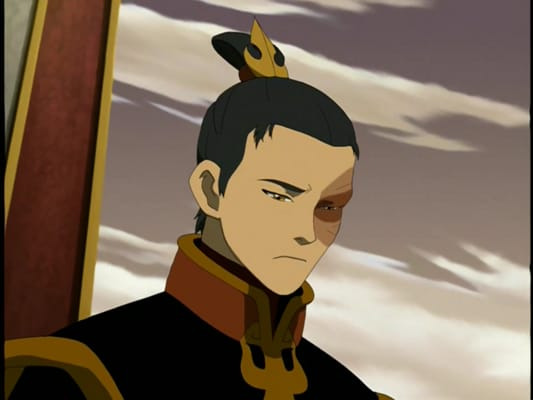
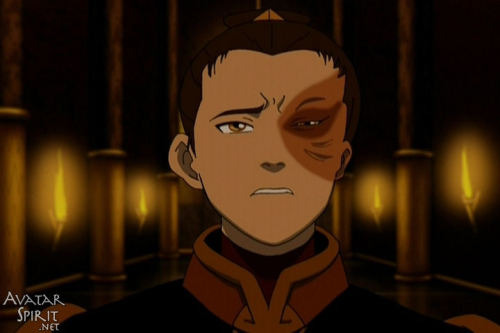

Ba Sing Se marks a turning point in Zuko's narrative that pretty clearly primes him for redemption, not just because he flirted with switching sides but failed, but because from the moment he chooses the wrong side, he knows, and everyone in the audience knows, that he chose wrong.
That's why it's not continually brought up or reminded to us that Zuko did a bad thing. Because he's already paid the price for it.
I've also talked a lot about how Zuko is manipulated by Azula, which doesn't negate the harm he does by choosing her side, but it does mitigate the gaang's understanding of why he did what he did and their ability to forgive him. Particularly with Katara, who is the person who does continually confront Zuko with what he did in Ba Sing Se. She gets the last word the first time Zuko tries to join the gaang and is rejected, and then specifically brings up Ba Sing Se to the others, and they agree with her, all except Toph.

Katara brings it up again twice after he's accepted into the gaang. But the reason she brings it up is not because Zuko needs to like, do reparations or something, or be continually punished for something that he felt bad about the instant he did it. It's because she can't trust him again after having her trust betrayed before.

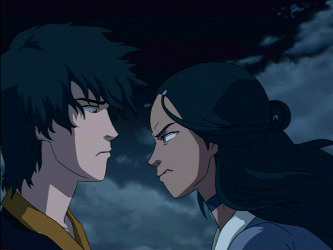
Which is why the focus is more on Zuko earning back Katara's trust, and Katara coming to understand that Zuko has genuinely changed.
Katara also comes to understand that Zuko was manipulated and that if he didn't side with Azula in Ba Sing Se, he would have been brought back as her prisoner. This is important for Katara as it relates to her arc with Azula and how that relates to her arc with Zuko. I'll never get over talking about how these three characters are intertwined. Katara goes from having to fight Zuko and Azula together in Ba Sing Se, after feeling betrayed by Zuko and not understanding why he sided with her, to protecting Zuko from Azula when she comes back for him at the Western Air Temple, and finally joining him against Azula, warning Zuko when she realizes Azula is trying to manipulate him again, and finally saving him from her.
Same with Zuko's arc with Iroh and how his betrayal at Ba Sing Se is about accepting Iroh's forgiveness, not about the specific actions he did. It's about Zuko needing to accept that he could be forgiven for his choices just as much as it is about atoning for them, so continually bringing it up as a mark against him would be pointless.
As far as him atoning for the specific actions, I think saving the world should be enough.
There's also the (neglected) parallel of Zuko and King Kuei as leaders that is established in "The Earth King" episode, with Zuko dreaming of being on the throne while being manipulated by a dragon with Azula's voice and not being able to make a decision, while King Kuei's inaction leads to the fall of his city and Azula using the Dai Li to take control. Zuko becoming the leader of his nation and ambassador of peace to the nation he helped to conquer definitely has a symmetry to it, and I think both of them work together and learn from each other post-series.
I've said this repeatedly, but what a character did in the past matters less than whether they've stopped doing bad things and are not motivated to continue doing those things. Once Zuko has proven himself as on the side of good, and once the characters who were personally wronged have already forgiven him, why would it need to be continually brought up?
As Toph points out, there's a difference between holding someone accountable and letting hurt feelings get in the way of making progress towards a greater good.
125 notes
·
View notes